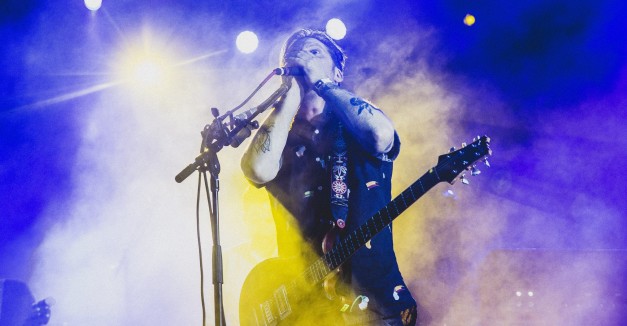When the words “sold-out music festival” were splayed out across Maha Music Festival’s official website and social media channels, the initial reaction might have been complete joy or a twinge of uneasiness. That the festival went off utterly, unmistakably without a hitch is a testament to Maha’s immense positive growth.
Attribute that landmark achievement to whatever aspect of the festival you see fit. One of the biggest, arguably most-anticipated headliners in Maha history graced the stage in Modest Mouse. The rest of the lineup boasted a strong stable of nationally touring indie rock outfits, a pair of hip-hop performances, and a high-quality, diverse array of local acts.
The addition in recent years of comedy and poetry performances have helped build a true festival atmosphere. Louder Than A Bomb poetry startled and amazed between musical sets, as well as in the the Globe tent on adjacent Mercy Road, next to the beer tent, local business vendors and ferris wheel. Those looking for cool respite from the heat also found fits of laughter in the Globe tent via the OK Party Comedy group. Both poetry and comedy had an intentional indie vibe, echoing the feel of the musical lineup.
Maha’s Community Village contributed to the festival’s homegrown feel through some 30 nonprofit organizations each offering interactive crowd experiences. Each year, the festival feels increasingly worthy of national recognition, as well as one whose personal touch hits close to home.
The “sold out” tag could have been cause for concern. Picture endless lines, constant waiting, late set times and disorganization. Note, instead, that the longest wait for music came after Purity Ring’s lights expired around 10 p.m. and stage techs cleared the stage for Modest Mouse.
As we’ve been reminded recently, putting on a festival isn’t as easy as constructing a stage and trotting out the bands. As Maha Board President (and Hear Nebraska Board Chair) Aaron Shaddy reminded from the Javlin stage just before Modest Mouse rocked to thousands, Maha is a nonprofit, run almost exclusively by volunteers. Behind the scenes, it takes many months of hard work, tight organization, big ideas and copious amounts of sweat to execute. And it takes legions of indie music fans willing to brave 95-degree heat for a packed day of music.
In a testament to all involved — fans, volunteers, vendors, Community Village participants and bands — the 2015 Maha Music Festival felt effortlessly and efficiently executed. While adding a second day to the festival has long been the desire for festival organizers, it would be hard to imagine what this seventh edition lacked to make that a reality in 2016. We’re already looking forward to it.
Below, find our full photo and written coverage of each band — from Omaha’s Both to Modest Mouse — as well as OK Party Comedy, Louder Than A Bomb Poetry, the Community Village and the 9,000-strong crowd.
Both
“Y’all came for a show,” BOTH’s Scky Rei said. “We’re gonna give you a show.”
The high-energy Omaha hip-hop duo warmed up with Rihanna’s “Bitch Better Have My Money.” Producer INFNTLP (pronounced: “infinite loop”) remixed the single’s industrial trap beats while rapper Scky Rei spun around the stage, his arms outspread like an airplane.
“We’re this weak-ass rap group called BOTH,” Scky Rei said, pulling from an ironic running joke about how the group’s music is horrible. Their website, as well as their new EP, exclaim “BOTH sucks.” This month, they released two parody videos on their Facebook page. They titled their March mini-tour “Don’t Show Up.” The consistency in this persona doesn’t suggest a lack of confidence. It’s surely the opposite; BOTH is just having fun with it.
Scky Rei and INFNTLP were a separate rapper and producer, respectively, before forming BOTH and releasing their self-titled debut. Since last year, BOTH have performed often in Omaha and Lincoln, and even opened for acts such as Mac Miller and Kid Cudi at Grassroots Music Festival in Council Bluffs earlier this month.
INFNTLP crafted atmospheric instrumentals that mixed with Scky Rei’s rough growls. Scky Rei’s limbs and torso popped to INFNTLP’s heavy percussion, his curls bouncing as he danced around the stage.
The early crowd participated in a call-and-response during “What’s the Word?” as Scky Rei wailed the chorus into the mic.
BOTH introduced songs from BOTHSUCKS EP, released Aug. 7 on Omaha’s Make Believe Records, the follow-up to last year’s self-titled debut. Scky Rei’s lyrics didn’t quit; he swiftly rattled off lines as INFNTLP surrounded his words in an audio haze.
Scky Rei thanked the crowd for coming to the festival early before inviting Make Believe New Media labelmate Rothsteen onstage for “Airwaves,” a single from the new EP. The Omaha R&B singer’s smooth vocals on the chorus created a dreamy collaboration with Scky’s low-pitched lines.
On the bigger stage at Maha, BOTH gratified the space with mesmerizing, hazy production and snarling vocals. As one of only two hip-hop acts at the indie music festival, Scky Rei and INFNTLP held its own in the rock-heavy lineup with dense beats and unmatchable chemistry.
— Kelly Langin
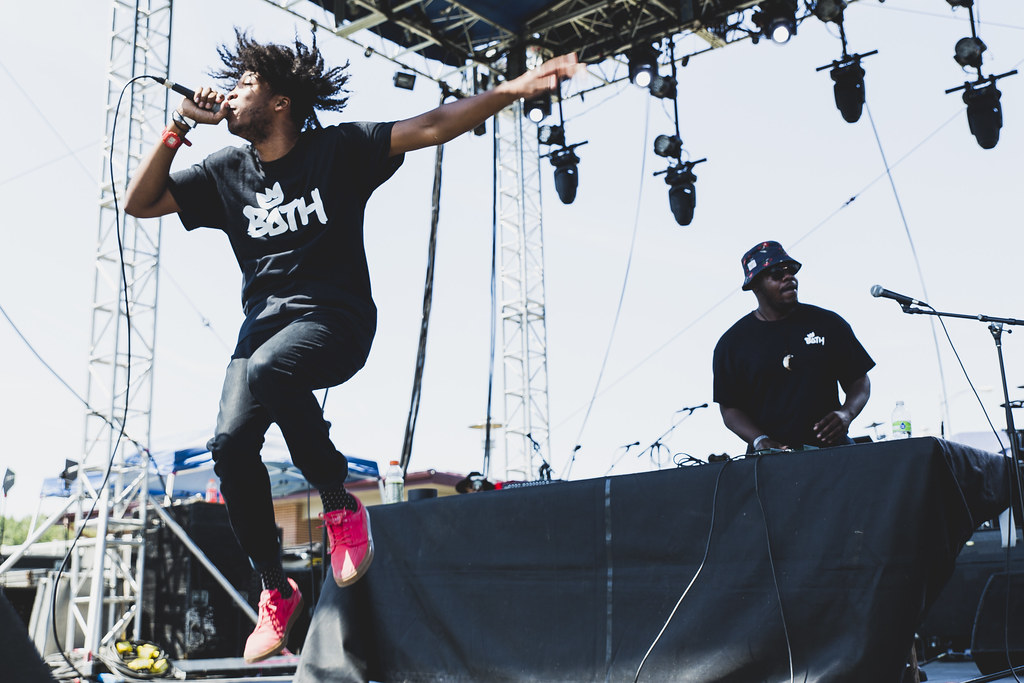
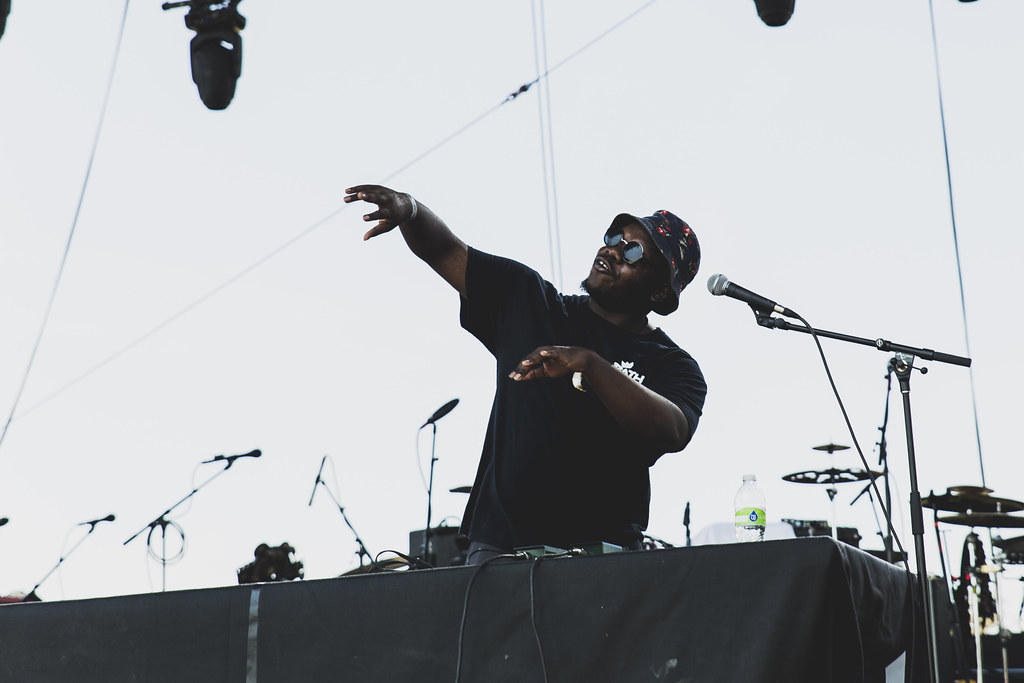
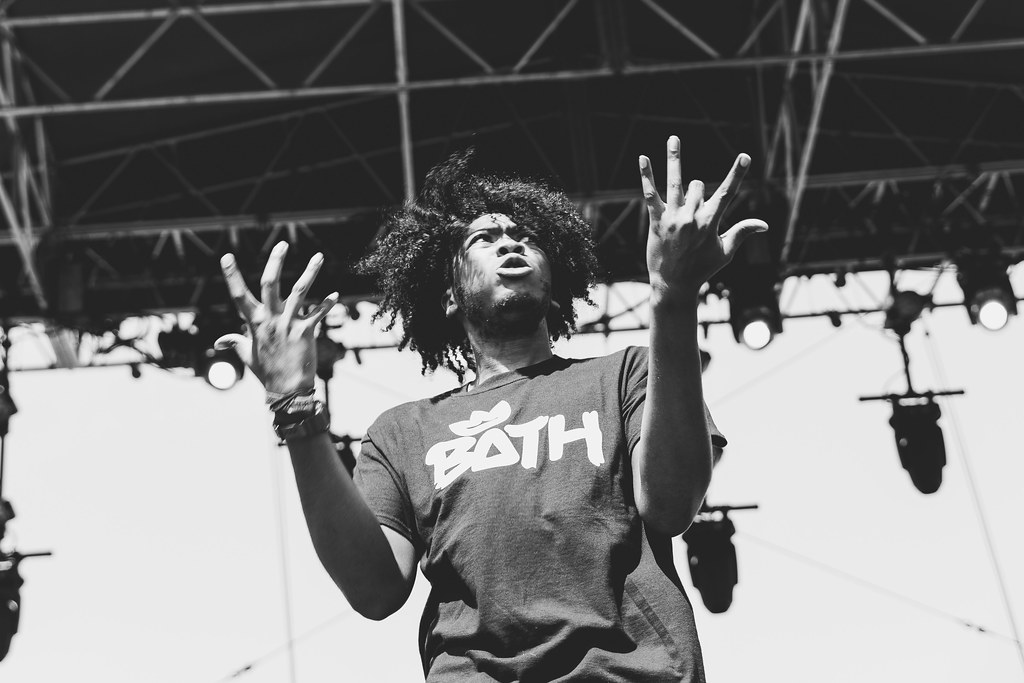 photos by JP Davis
photos by JP Davis
Freakabout
Freakabout’s Maha debut was bittersweet for the Lincoln group. Toward the end of their set, the quartet announced a lineup change for the first time in the group’s history. Maha — a watershed opportunity for a local band — would be the last Freakabout performance for bassist Alex Drvol.
For Drvol’s final show, the band gave sounded polished and high-energy on the Bradford Bowl stage, headbanging and dancing their way through the afternoon. Slow-motion moments bookended between high energy ones as lead vocalist Cortney Kirby belted dark and fiery lyrics.
Many of Freakabout’s songs quieted their instrumentalists for moments, allowing Kirby’s isolated and electric vocals to be heard. Other times, Kirby took a backseat to drummer Zach Zoellner, guitarist Aaron Galvan and Drvol, who played fiercely.
Onlookers scattered and stretched from the stage, with many people dancing, nodding and singing along — I even heard someone scream “I love this song” as Freakabout revved up.
At just after noon, Freakabout’s molten rock pierced the afternoon air. The group’s sound is typically guaranteed to work well in a venue that allows intimacy and enveloping sound. But the band didn’t feel out of place, even at a festival that heralds alternative rock bands such as Modest Mouse, The Good Life and Speedy Ortiz.
Guitarist Aaron Galvan even referenced approaching their timeslot like normal, asking the crowd, “How many of you guys have been drinking since 9 like us? Well we want you to party like it’s 3 in the afternoon.”
Freakabout’s compelling set felt like a celebration. For Drvol’s final Freakabout show, playing for a cheering Maha crowd was a fitting way to cap a four-year run.
— Gabriella Martinez-Garro
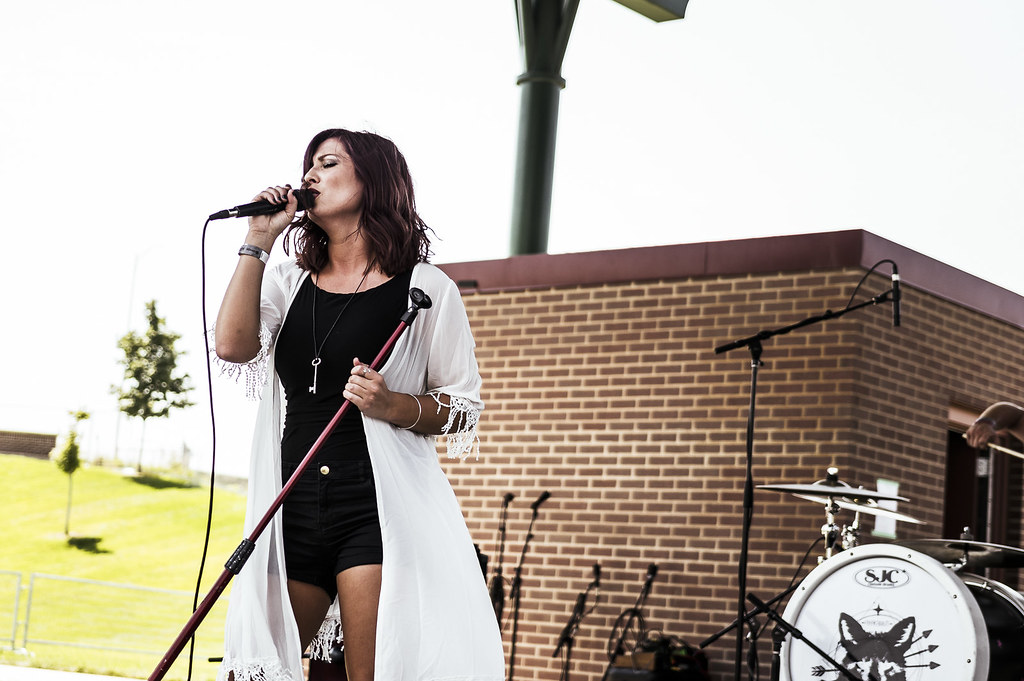 photo by Peter Barnes
photo by Peter Barnes 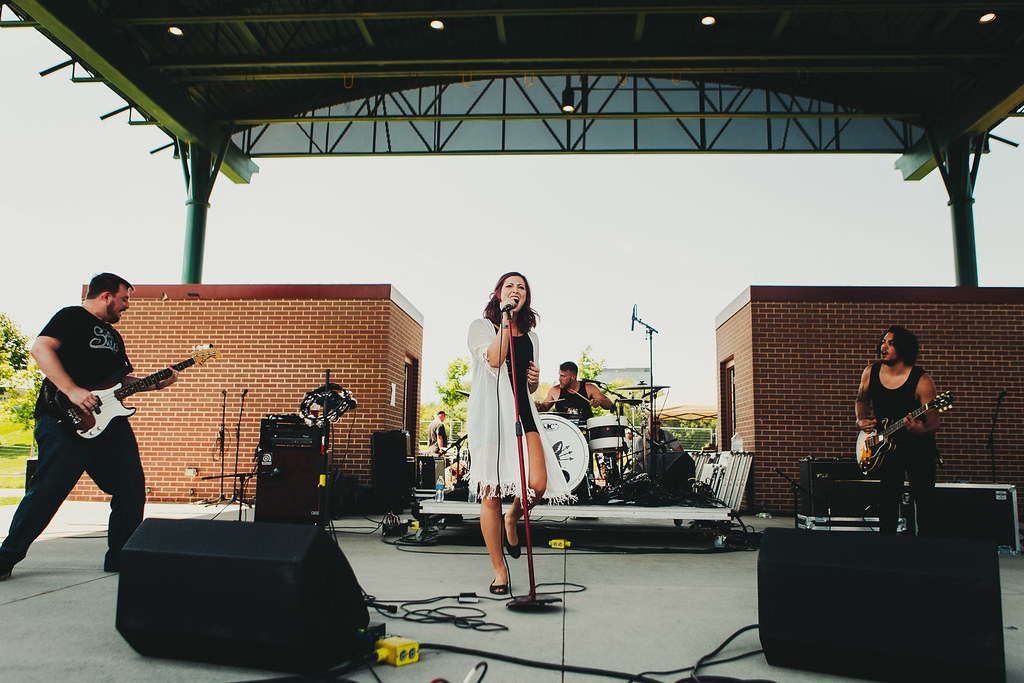
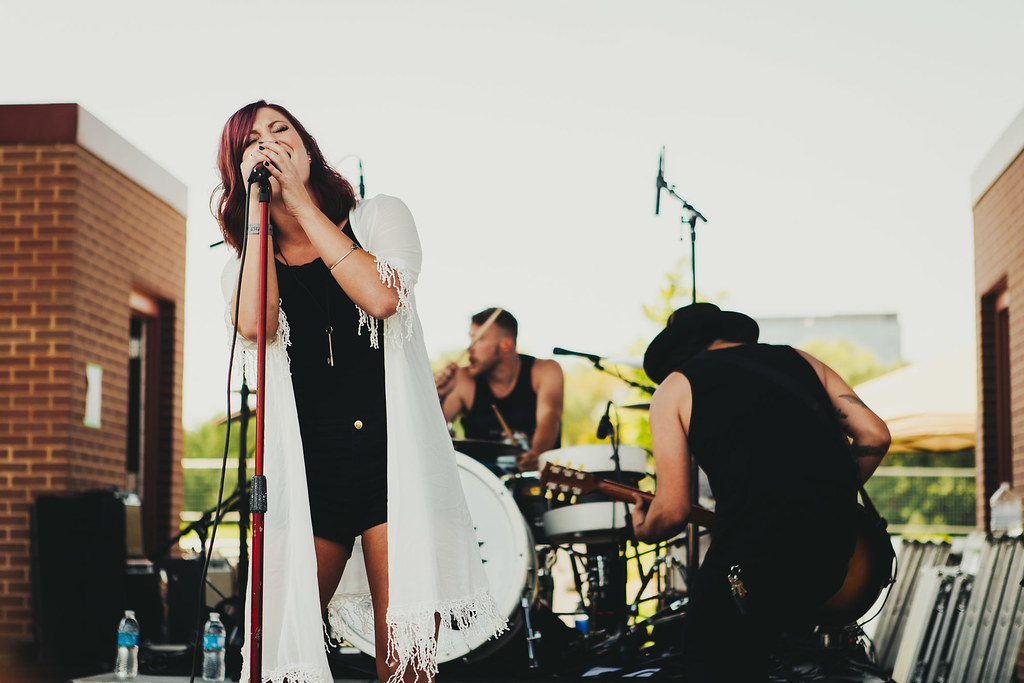 photos by Huy Nguyen
photos by Huy Nguyen
Ex Hex
It would be easy to fall into the dramatics and romanticism of Ex Hex’s ’80s fantasy aesthetic. It opens the door for overblown theatrics and superfluousness. But if the three-piece punk outfit’s set was short on anything, it was drama. Warming up in the shade of Maha’s main stage, Ex Hex was all Converse, black tights, sequin dresses, black shirts, black shades, cheetah print and hot pink. The fog machine was rolling before their set began. The D.C band’s professionalism might not be apparent on first look, but, at its heart, Ex Hex consists of little else. The songs came fast, starting and ending without pomp and circumstance. Played live, each track on their debut album, , offers a kind of lip-biting, snarl-mouthed intensity that isn’t always apparent in the recordings. Frontwoman Mary Timony, bassist Betsy Wright and drummer Laura Harris traded distortion-filled riffs, shouted harmonies and frequent solos. At some point in nearly every song, the guitarists leaned together and apart in V-shaped stances on either side of Harris. It’s true the lyrics are about relationships gone awry, parties and youth’s indirection; “Surely there was no one to guide us/you know what I mean,” Timony sings on “Waterfall.” More powerful than the subject matter, though, was the delivery. Timony’s decades-long career — in bands such as Helium and Wild Flag — is made evident in her balanced vocals and composed stage presence. Occasionally, she bobbed with the rhythm or threw her head toward the microphone with lines such as, “When you count on nothing, nothing comes along,” from “Beast.” But, mostly, Timony stood still. She played with the intent of perfection. After Wright blazed through a bass solo that had the crowd screaming mid-song, Timony bent down to sip from her beer while Harris and Wright locked rhythm. She stood slowly, set her fingers and, with little adu, launched into her own solo, darting over the guitar’s highest register, missing nothing. Timony played as if a single off note would ruin her gift to the audience. It’s a testament to each member’s experience that a relatively new band can feel so seasoned. In the same way each song off its debut album exists taut and free from the extraneous, Ex Hex commanded a lean set — a display of restraint despite all the potential for outsized flare. At the end, in perhaps the most exaggerated gesture of the whole performance, Timony blew a kiss to the crowd as she walked off stage and waved it with her arm across the whole of Stinson Park. As abruptly as they’d began, Ex Hex exited no-nonsense, leaving only an audience wanting more. — Nate Sindelar 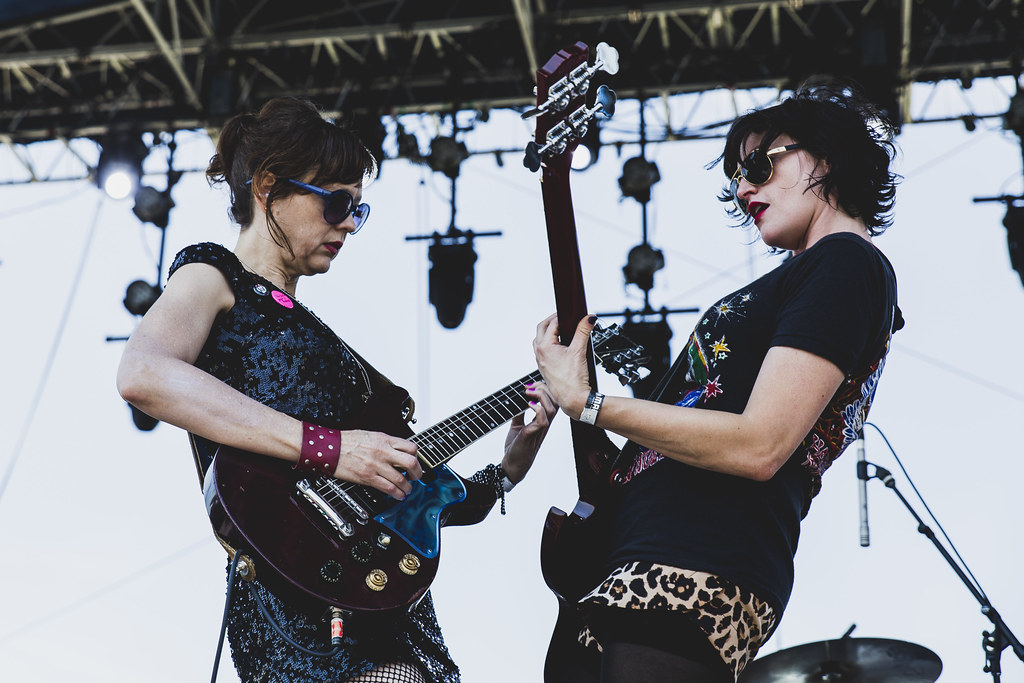
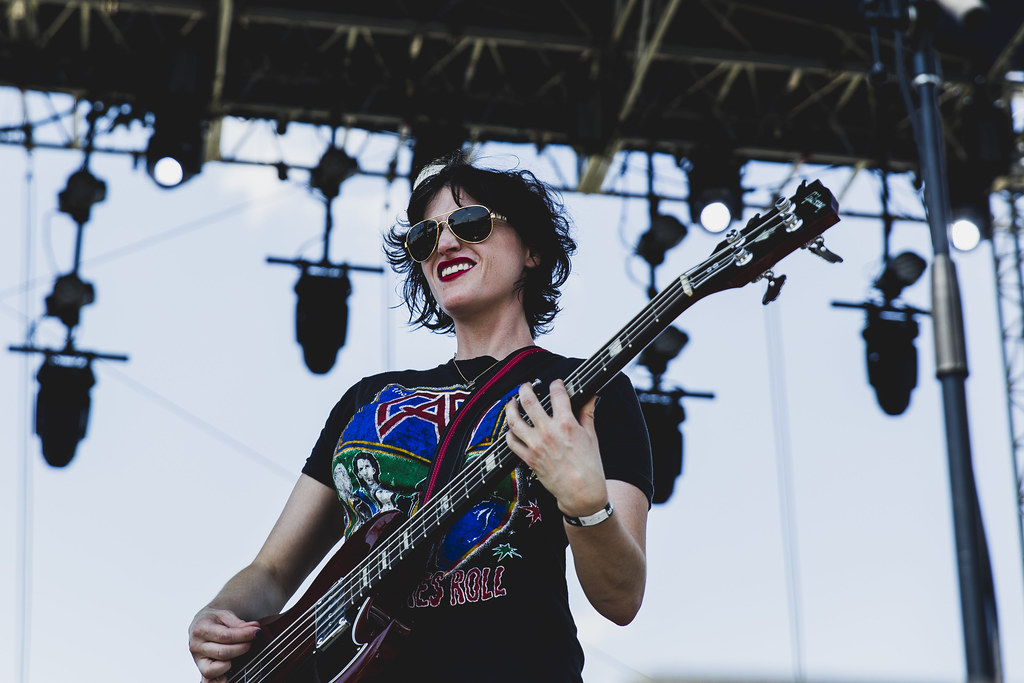
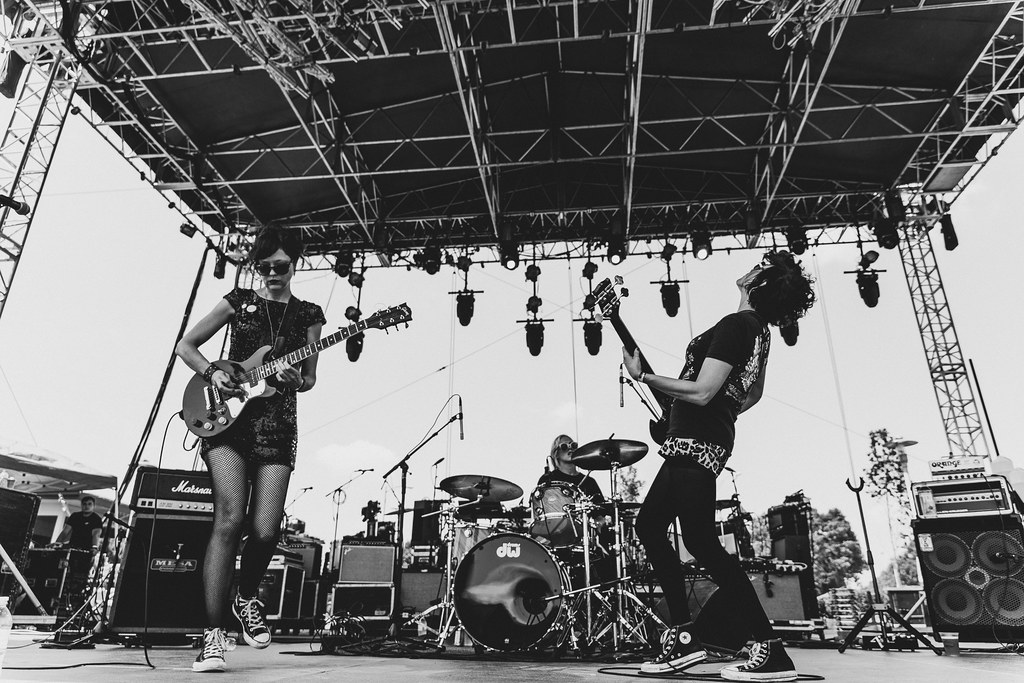 photos by JP Davis
photos by JP Davis
Alvvays
Hula hoops and beach balls debuted at Alvvays’ dreamy midday set as the Canadian natives brought sweet harmonies and sunny surf pop to the Bradford Bowl stage. The band’s eponymous debut album garnered good reviews and plenty of buzz last year, but their live performance offered even more vibrancy and transparency than the record. Clad in polka dots, stripes and varying shades of blue, the five-piece indie pop band took the stage to cheesy synth music, then played the B-side “Your Type” and “Next of Kin” back to back. Like many of Alvvays’ breezy songs, “Next of Kin,” sounds deceivingly lighter than its lyrics suggest. “I left my love in the river / The only one who sees / I lost his hand in the current / It was the life I wanted and I hoped for / And now I’m left sifting through the leaves,” Rankin sang impassively. Lead singer and guitarist Molly Rankin took time to thank everyone for coming out and to praise Maha’s lack of barrier between the Bradford side stage and the crowd. “There’s usually a huge barrier at festivals, it’s very sad,” she said. The intimacy allowed for plenty of awkward anecdotes and crowd interaction. Rankin joked about how the band thought Omaha was a state before arriving, and one member thought it was Bill Clinton’s hometown. She said they confuse Nebraska and Arkansas frequently, which was a little off-putting and unaware. Alvvays made up for it with stand-out songs such as “Marry Me Archie” and “Ones Who Love You.” Those tracks displayed the strength of Rankin, keyboardist Kerri MacLellan and guitarist Alec O’Hanley, whose wavering harmonies brightened each song. Alvvays also introduced some new material that allowed Ranking some falsetto experimentation without diverting much from the group’s dream pop sound. The band closed with “Adult Diversion,” another dynamic song in a consistently spirited set. Though early in the afternoon and lighthearted in sound, Alvvays’ smart lyrics and warm interactions left a lasting impression. — Gabriella Martinez-Garro 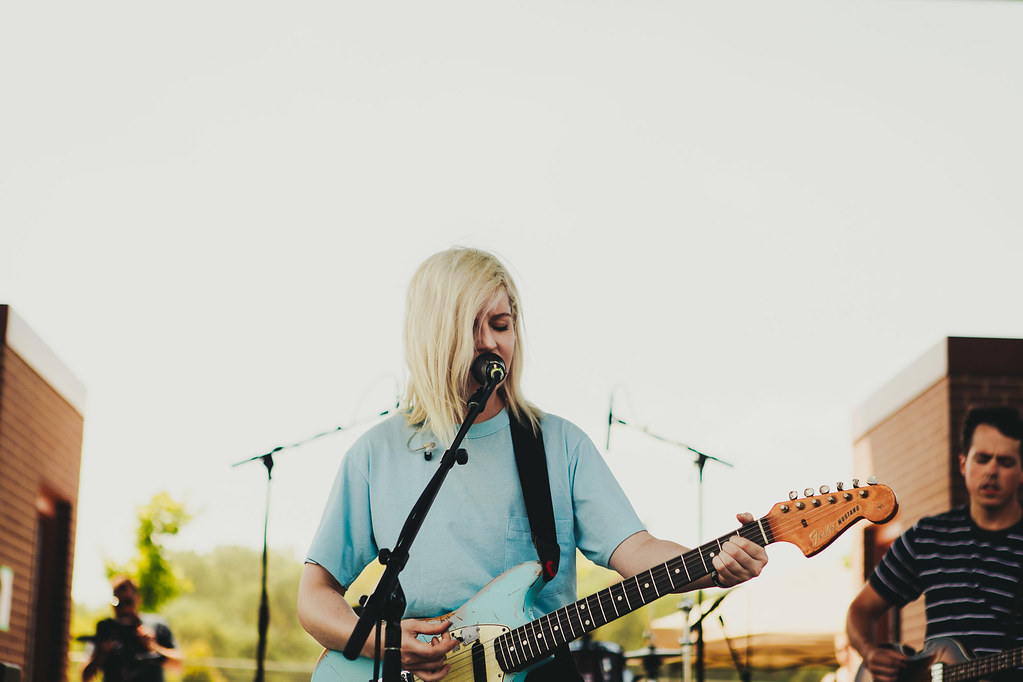
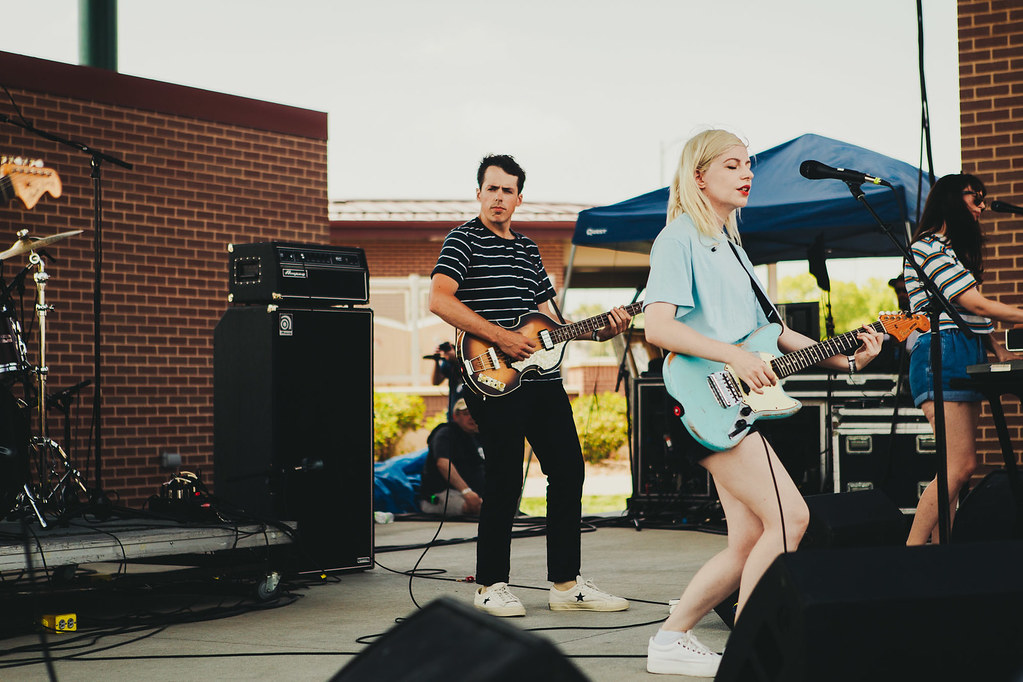
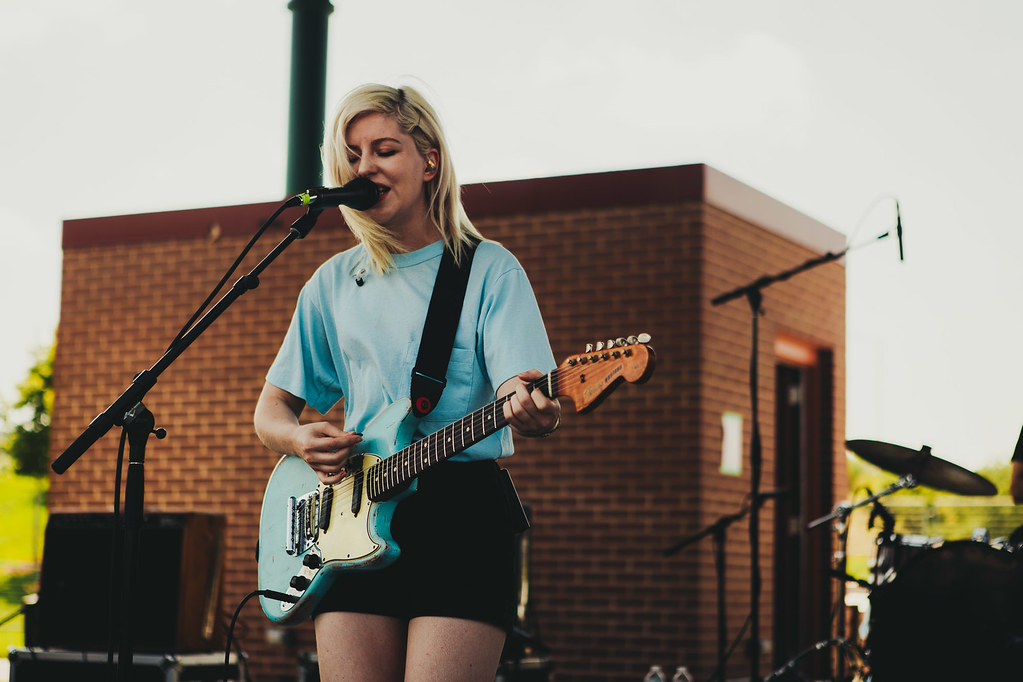 photos by Huy Nguyen
photos by Huy Nguyen
The Jayhawks
Bright and cloudless, save for stray contrails, Saturday was full of sweat-soaked ball caps and sunscreen, beer cans and water bottles wedged into back pockets. It was a day that looked decidedly Midwest — cutoff shirts and shorts, 10-gallon and straw cowboy hats poking above the crowd. When The Jayhawks took Maha’s main stage, Saturday also sounded a lot like the Midwest.
Like The Reverend Horton Heat, Bob Mould and other experienced acts of Maha lineups past, The Jayhawks carried the festival’s veteran band label. Consider them rockabilly or country-rock, alt-country or even alt-rock — the Minnesota-based band’s music could fall into any of the categories across its 30-year discography. Fronted by Gary Louris, band tends to encompass something broader or more cohesive than a hyphen can suggest. With six on stage, their sound was as full as it was pleasant, blending piano and banjo with rhythm guitars and, at times, violin and harmonica. By the time The Jayhawks began, Stinson Park was filling, and heads (and cowboy hats) were keeping time.
It’s not hard-rocking music, and it’s not full of twang, either. The lyrical gaze shifts backward rather than emphasizing the now or future. The songs focus on scars of the past more often than the pain of immediacy, and The Jayhawks express these feelings in codified turn-of-phrase and images that become representative over time. Louris sang of things that “sink like stones.” In “Angyline,” the characters “threw it all away,” a common line, no doubt, that channels a relatable, folksy regret. In a few new songs, the narrator wondered how he let slip away a woman with “pretty roses” in her hair. There were “comeback kids” in the unreleased verses and calls to “take a chance on me.” The images are familiar and the sentiments are nigh universal.
People moved to The Jayhawks more than any band to that point in the day, and the message was in their motion. Fans swayed and bopped up and down on tip toes, nodding with the music as if in agreement as much as enjoyment. There seemed to be a common understanding in the sound and lyrics, something reflective, perhaps, of a Midwestern state of mind.
The longer the 16-song set went, the more comfortable the crowd became. People sang along and held each other, presumably basking in memories or the moment. Louis tuned his guitar for the final song, “Tailspin,” and said, “We’ve got to come back to Omaha.”
— Nate Sindelar
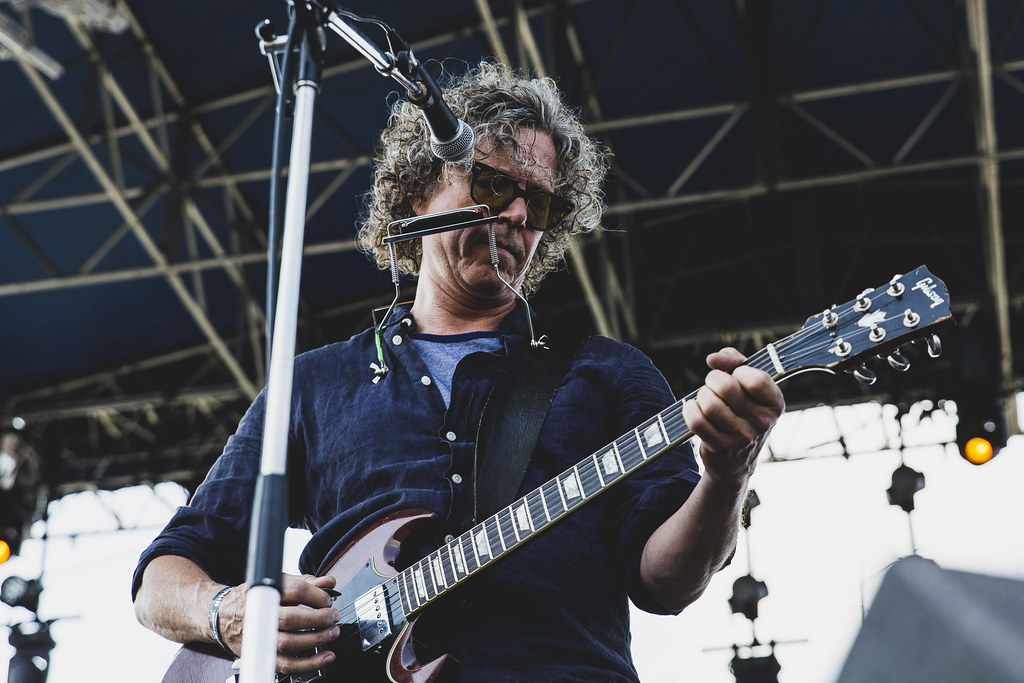
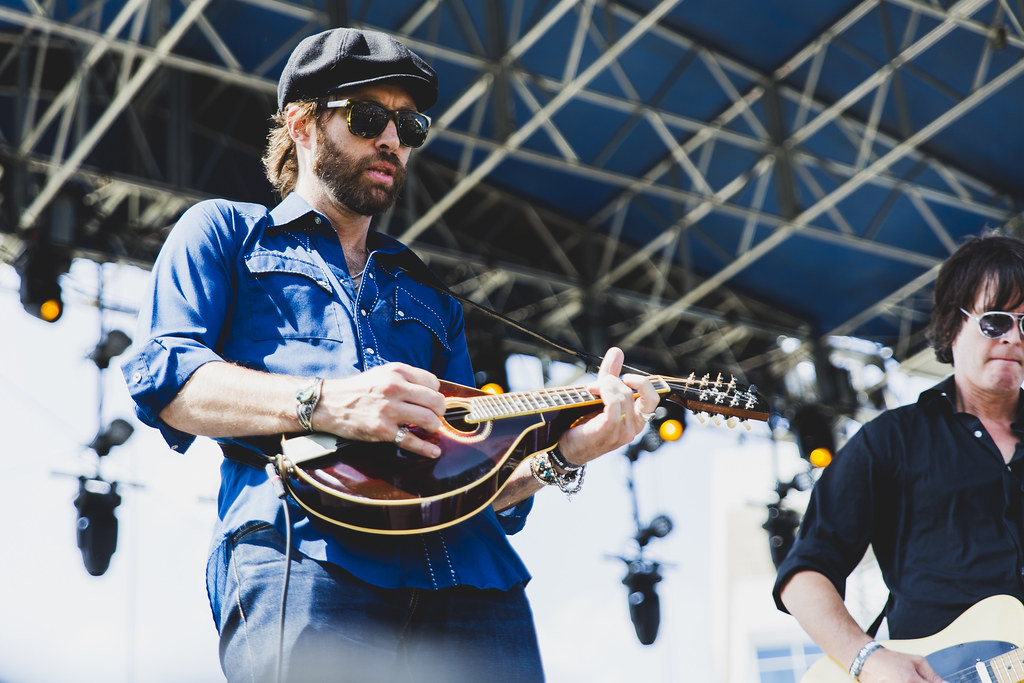
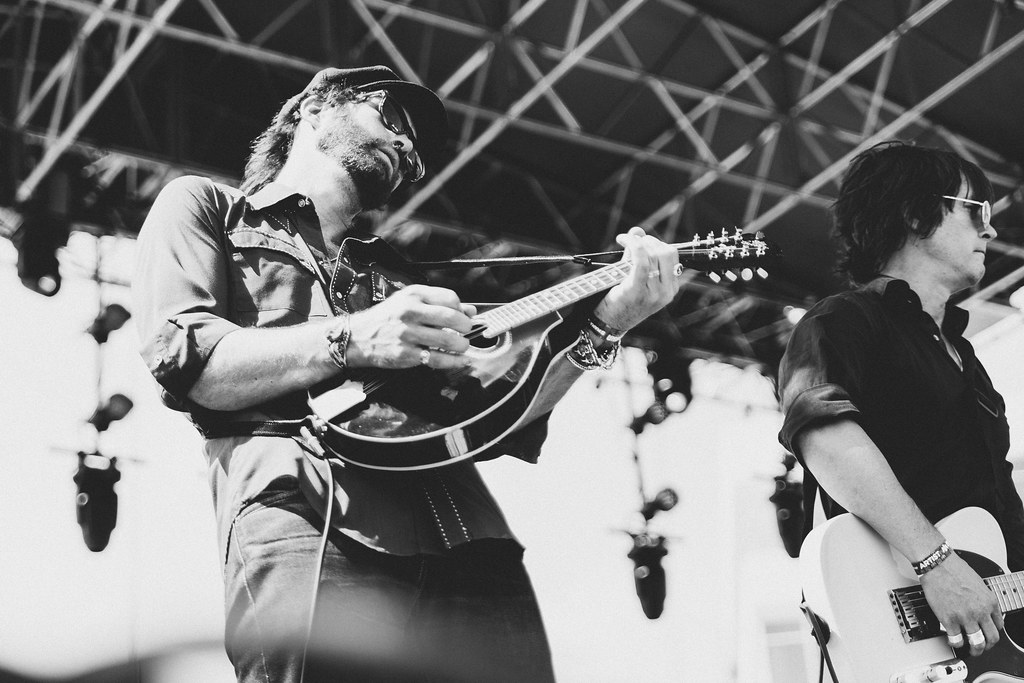
photos by JP Davis
All Young Girls Are Machine Guns
All Young Girls Are Machine Guns’ mid-afternoon set was balanced between impassioned slow burners and lively dance numbers.
The Omaha band’s jazzy, Motown-influenced sound stood out from other Maha artists, and did well to break up the late afternoon and lead into the headliners. The soulful seven-piece group delivered a joyful performance, complete with doo-wop and powerful harmonies.
It was hard not to feel the love when frontwoman Rebecca Lowry checked to ensure the audience was applying sunscreen and drinking plenty of water, stating, “Holy bananas, you’re all so beautiful.”
Though friendly in sound, All Young Girls didn’t dull their lyrics or performance. Lowry, the band’s primary songwriter, often writes songs with biting lyrics. Some tell stories of women scorned and others of relationship doubt. The sincerity of those songs — mixed with sultry brass and an energetic pace — gave the group some mass appeal.
While All Young Girls has multiple forms (including Lowry solo or with one or two accompanying instrumentalists), the full band made sense for Maha. Full, lush sound flowed off the stage while couples twirled and swayed. The band brought out the most kids and families of the day, many of them dancing or lounging in the grass.
As their set came to an end, All Young Girls’ honed sound vibrated through the grounds, lyrics resonating with older listeners as they set the bar high for the upcoming acts.
— Gaby Martinez-Garro
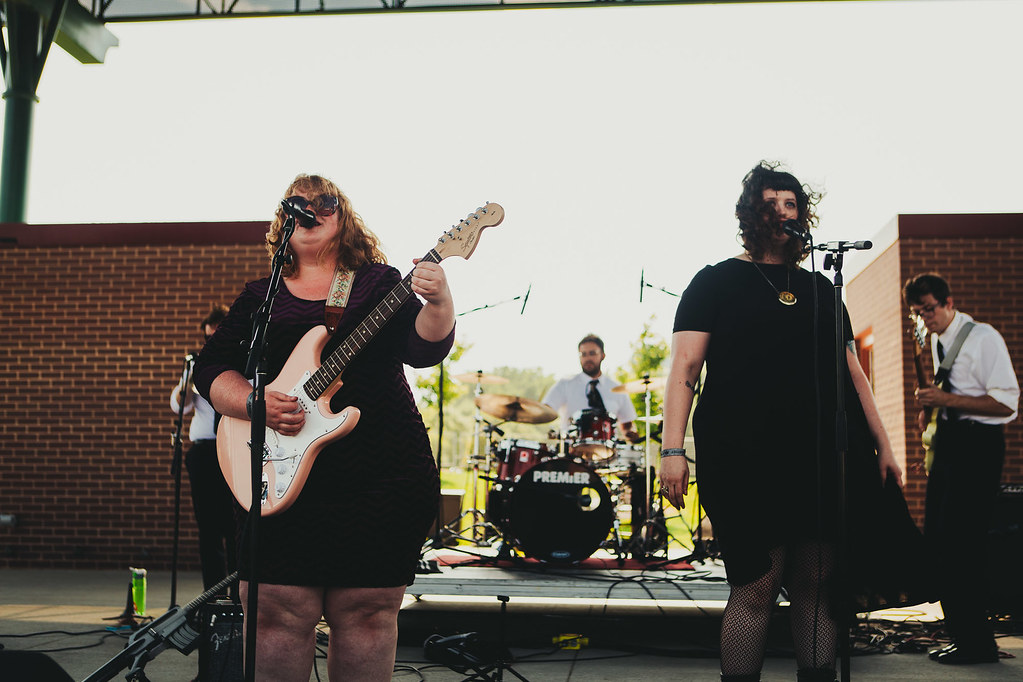
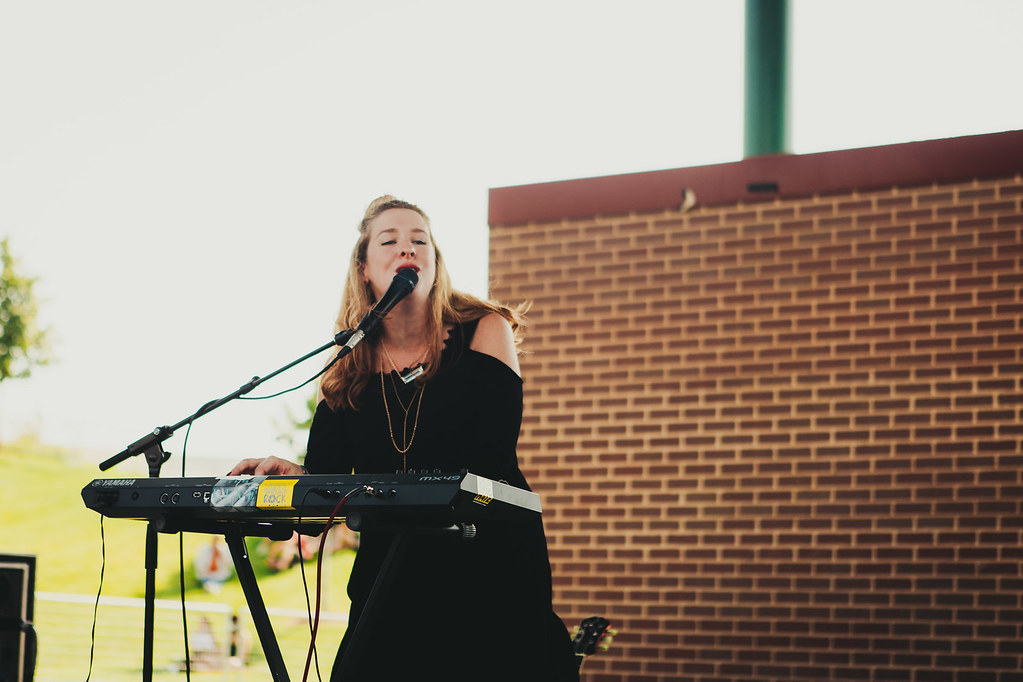
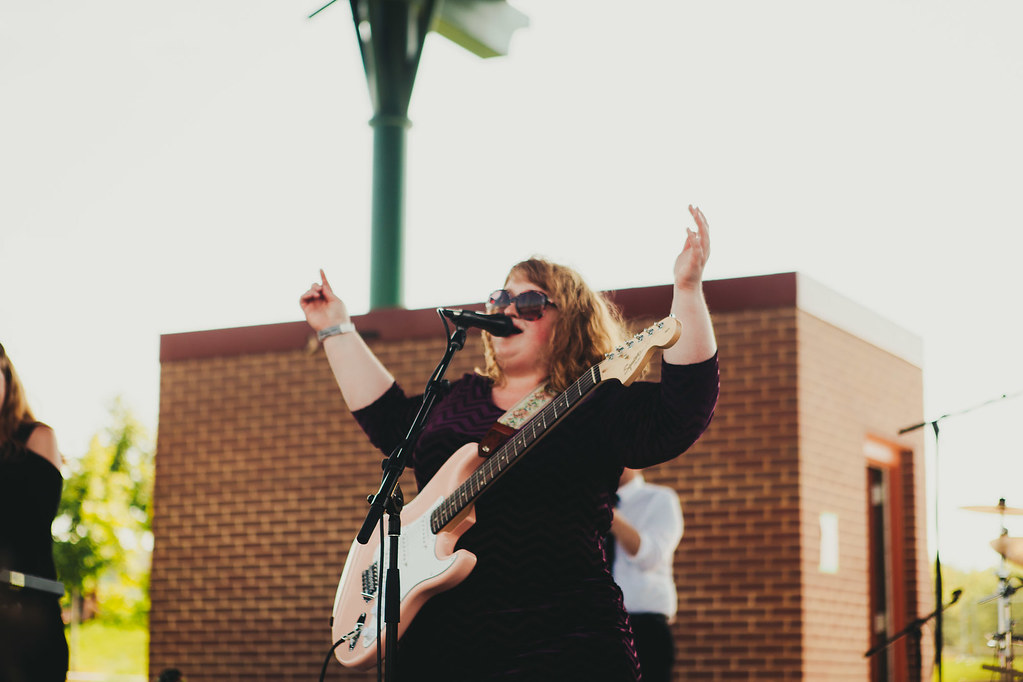 photos by Huy Nguyen
photos by Huy Nguyen
Omaha Girls Rock
In her first music festival performance, the young vocalist’s dreamy voice floated as the keyboard and guitar rang with complementing melodies. The crowd of hundreds cheered and sang along to the confident lyrics. The Good Life’s Stefanie Drootin, founder and former executive director of Omaha Girls Rock, joined Vintage Paisley on bass. Vintage Paisley, an all-female band formed from the nonprofit Omaha Girls Rock, played a song they wrote at the rock ‘n’ roll summer camp in July. The song’s lyrics — with sing-along chants such as “stay true to you” and “don’t let no one get in your way” — echoed Omaha Girls Rock’s mission to empower young girls. Maha’s continued tradition of showcasing an OGR band on such a huge platform is a nice gesture, and a nod towards a hopefully bright future. — Kelly Langin 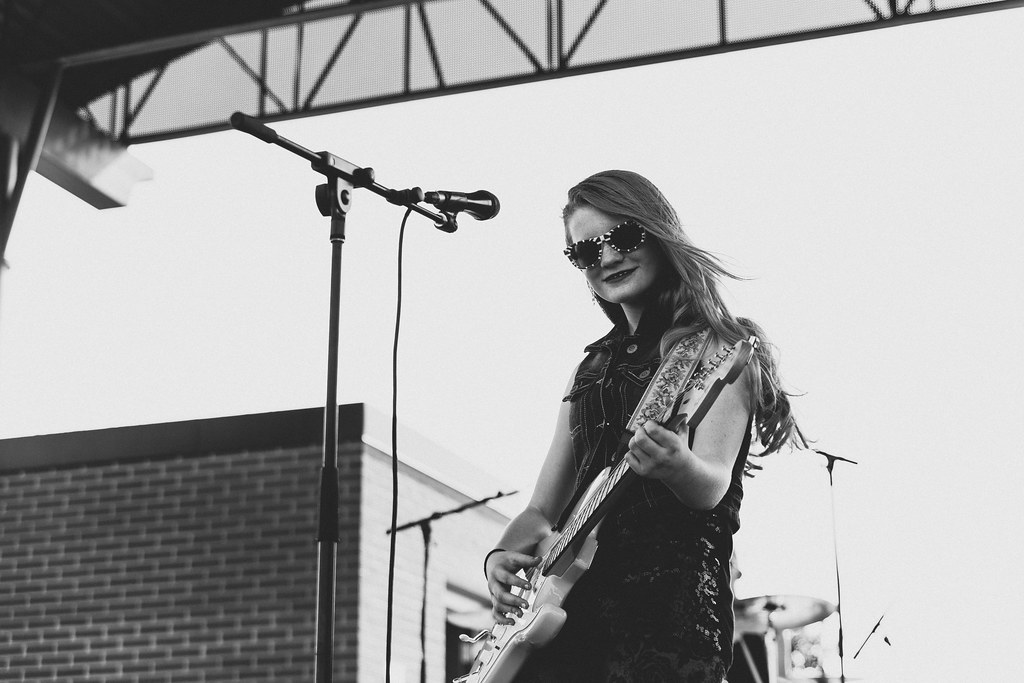
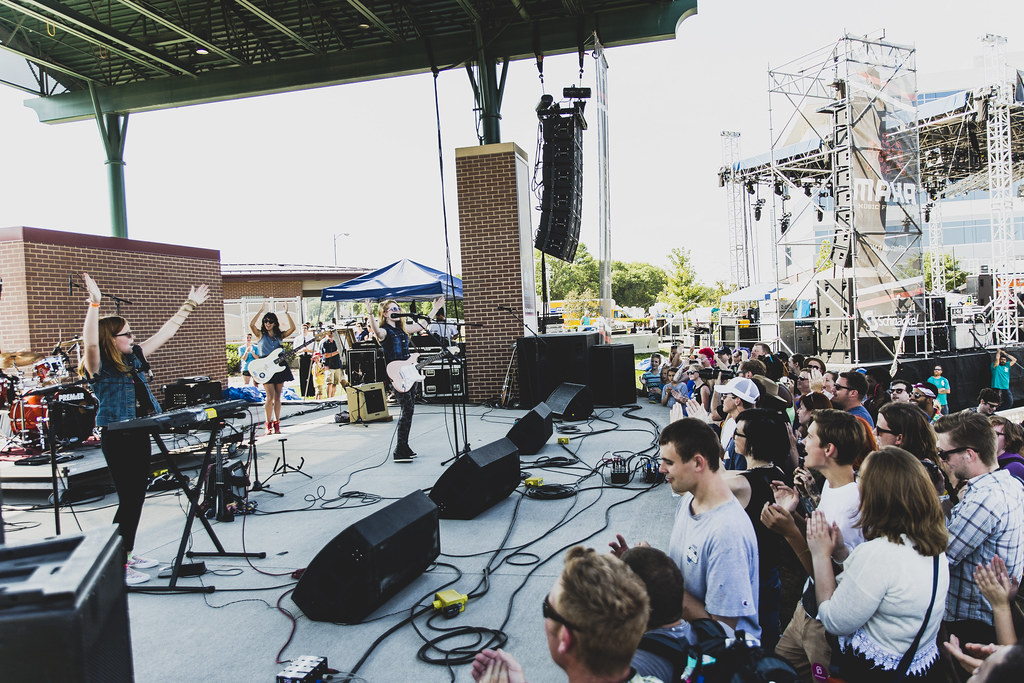 — photos by JP Davis
— photos by JP Davis
Wavves
As the high mid-afternoon sun baked the crowd in a 90-degree haze, contraband joints began to make their way out of backpacks. The timing was perfect for stoner punk band Wavves to jam with festivalgoers to its summer-friendly songs. When San Diego-based Wavves last played Omaha — at The Waiting Room in 2013 — the band invited the audience to crawl onstage, and frontman Nathan Williams jumped into the crowd with his guitar. This time, the band spread out on Weitz Stage in front of thousands, seemingly slightly less at home with an eight-foot gap, security and a fence between it and the audience. Regardless, Williams’s monotone drawl and guitarist Alex Gates’s melodic shredding opened up the afternoon’s first mosh pit. Three songs in, Williams’s amp blew. He strummed an unintentionally distorted chord, to which he joked, “That doesn’t sound so bad.” Williams shrugged off the hiccup by launching straight into “Post Acid,” a fast and fiery love song to drugs. A red stake that held a pink-ribbon-clad potato bobbed above the friendly mosh pit. The audience dodged each other’s shoves as they shouted along with Williams, “I’m just having fun with you.” Wavves mostly played tracks from 2010’s King of the Beach and 2013’s Afraid of Heights. The band’s latest release was a collaboration with fellow emerging garage punk band Cloud Nothings. Although the gap between stage and crowd was too large for Williams to scale to get rowdy, Wavves belonged in the hot Omaha sun. With gritty guitars and apathetic lyrics, the set was an impeccable soundtrack for the sweaty, dancing humans banging their heads and raising their fists in the air. — Kelly Langin 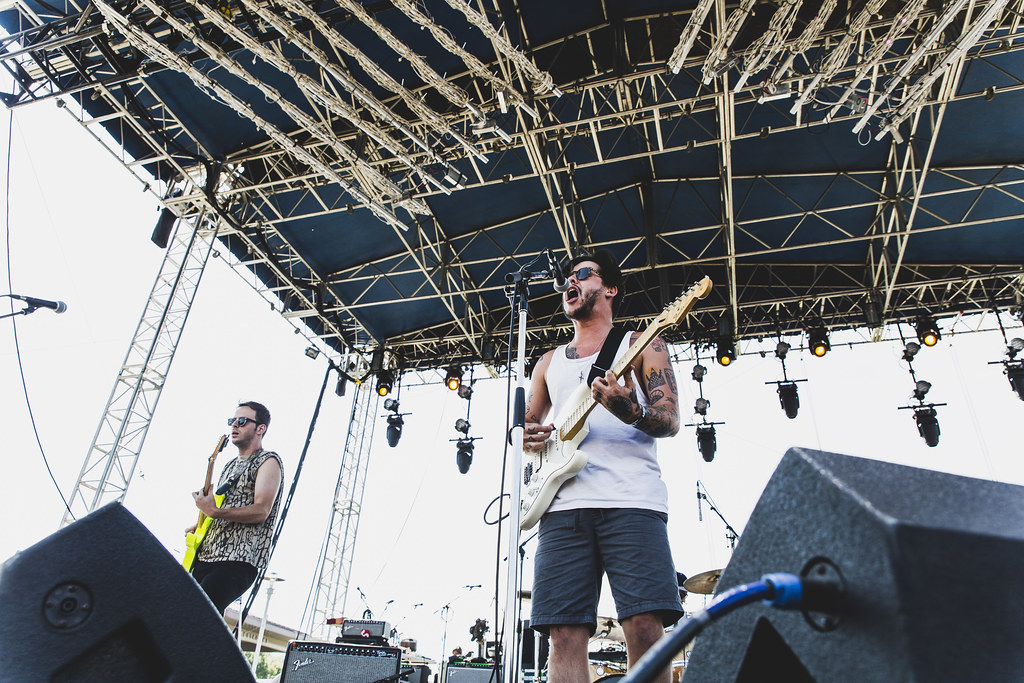
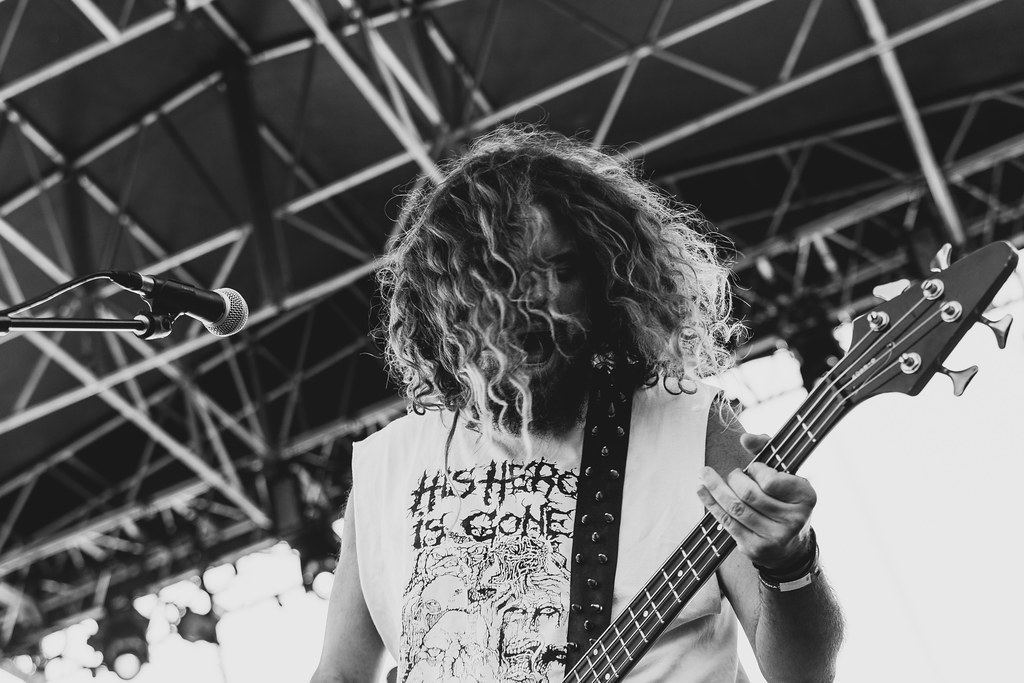

photos by JP Davis
Speedy Ortiz
Mid-festival sets aren’t exactly flush with time. Stopping to make a point might only happen if the cause is especially near and dear. Three songs into an increasingly chaotic set, Speedy Ortiz frontwoman Sadie Dupuis paused to comment.
“It’s pretty cool that Maha Fest has a gender distribution that matches the rest of the world,” Dupuis noted with an air of pride and excitement.
The attentive, socially conscious Maha attendee might have noted beforehand that only one-third of the scheduled bands were all-male. This was the first time anyone had acknowledged that fact all day, and her words were met with an uproarious cheer.
Massachusetts-based Speedy Ortiz returned that sentiment in kind. It shredded and sliced its way through a 40-minute parade of garage rock, blending alternative ’90s influences with cacophonous prog-rock.
Dupuis’ and guitarist Devin McKnight’s competing chords and lead lines stood at the forefront of the noise, backed by Darl Ferm’s thick bass and Mike Falcone’s furious drumming. The dissonance (reminiscent of At the Drive In) on “Plough” echoed Dupuis nervy, manic warning to a spazzy friend: “stop, it’s freaking me out … freaking me the fuck out.”
If tracks like “Tiger Tank” and “Bigger Party” hint at swallowing Dupuis whole in their recorded forms, their live versions outright threaten it. Abrupt time changes and quick starts and stops add to the instrumental on-the-brink maniacism. “Bigger Party” came with a heavy dose of irreverence, Dupuis singing a half-hearted apology for “that time that I made out with all your friends.”
Speedy Ortiz continuously fed off its own energy, which came to a head with set closer “American Horror.” Squealing guitars spun out from all ends of the stage, crashing to a close with a furious outro. No other act seemed to match that particular level of grungy disorder and lyrical uneasiness, which made for a mid-day treat.
— Andrew Stellmon
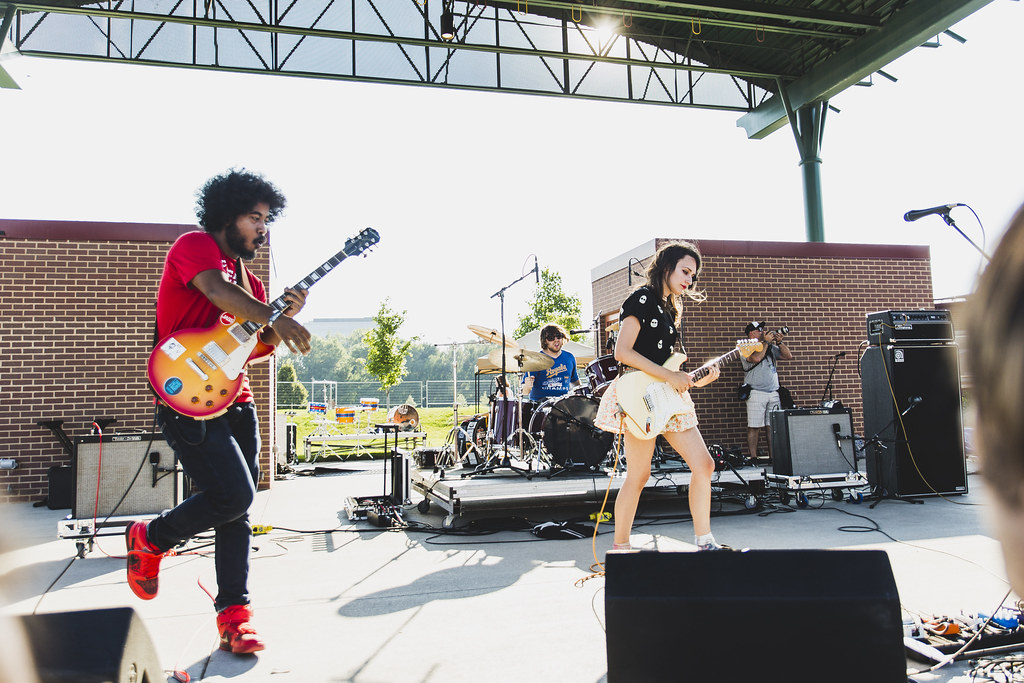
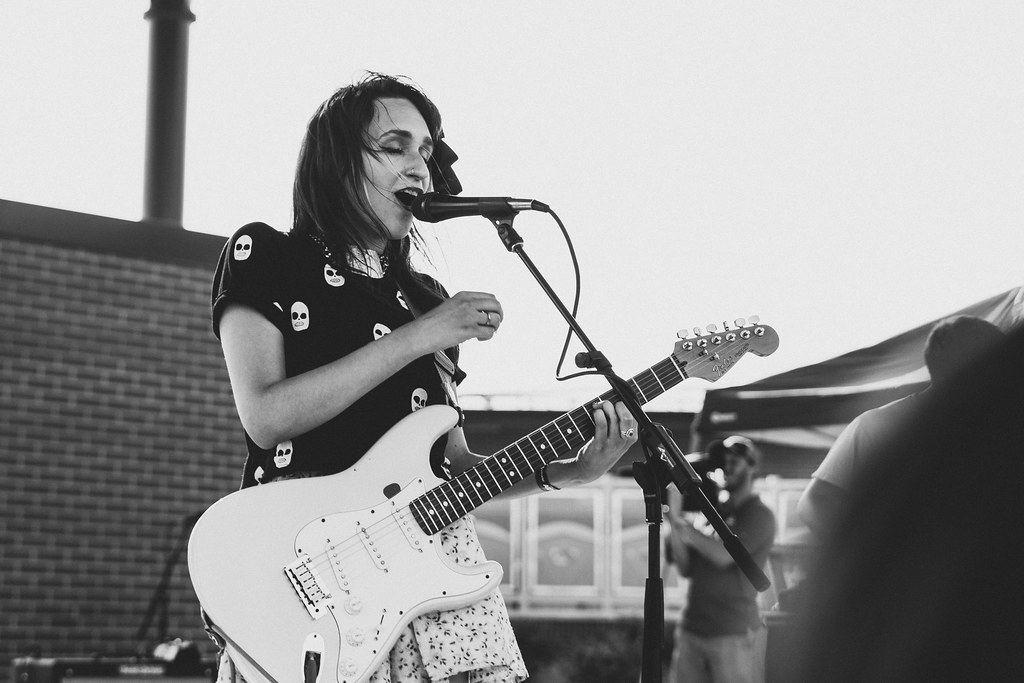
photos by JP Davis
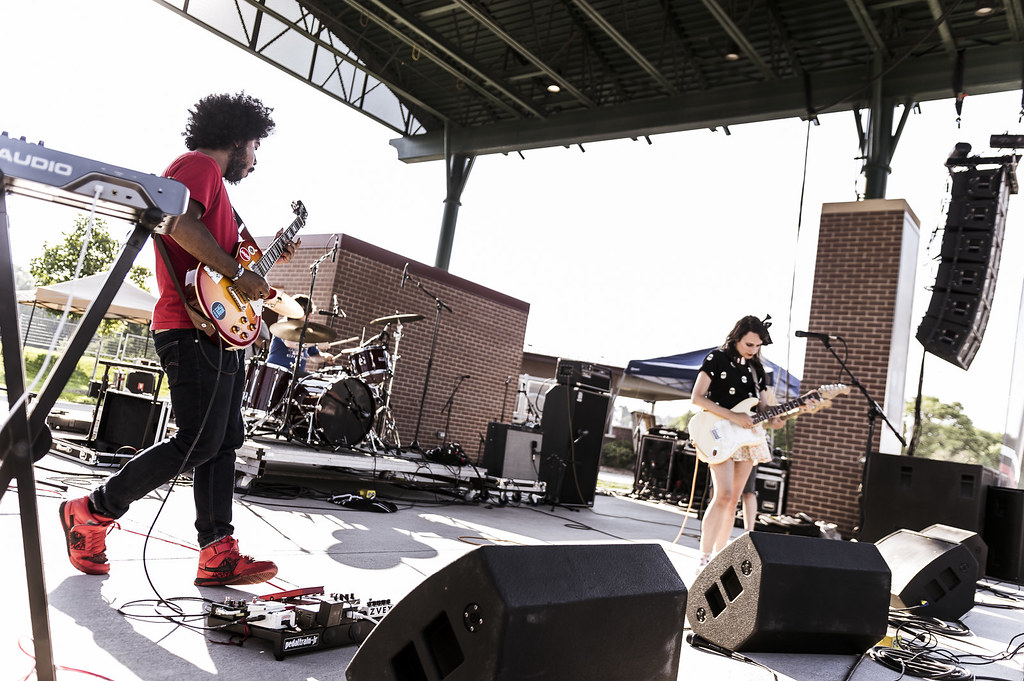
photo by Peter Barnes
Atmosphere
Apart from other trends this year at Maha, the music of some performers contained a notion of dissatisfaction — a stirring arousal of social and political discontent. From the ferocity of opening act Both to the slam poetry interludes, all the way to Isaac Brock’s long-held lyrical bone-to-pick, the energy was raw, and the music shifted at times beyond simply moving fans to declaring impassioned statements.
In terms of exasperation, Minneapolis-based hip-hip duo Atmosphere is a high practitioner. While their work centers on and explores scenes of personal unrest, their tone Saturday was harsh and biting. Before the song “Fuck You, Lucy,” rapper Slug aka Sean Daley asked the crowd to help him recapture his youth.
“Put your middle finger up,” he said. “No, both ‘em both up.”
Throughout the set Daley spoke to attendees, charging them to act out physical symbolisms of his words. In an adaptation of “The Loser Wins,” in which Daley included phrases from Sage Francis’ “Slow Down Ghandi,” fans held two fingers in the air as scissors to “cut the noose.” For “Shoulda Known,” a track from If Life Gives You Lemons, Paint that Shit Gold, he told the crowd to hold up their fists as hammers, commanding the audience in a way no other artist had Saturday. "Bang. Bang. Bang.”
Yet, in all this, Atmosphere’s set came to a close with a sense of gratitude and hope. Drawing on the sun, which set over Omaha and burned against the back of DJs Ant (Anthony Davis) and Plain Old Bill, Daley roamed the stage dramatizing his lyrics with wild gestures and facial interpretations. His intensity turned from anger and disappointment to good will as he distanced himself from the person he was in youth. “Raise your hands if you’re happy to be alive,” he said. And over songs like “Fortunate” (off the group’s latest album, Southsiders), and “Sunshine” (from the Sad Clown Bad Summer EP), the sentiment became one of thanks.
Atmosphere performed from the foundation of nearly two decades of experience, having released albums or EPs nearly every year since 1997 and touring all the while. Daley executed with confidence and composure, even if his practiced state of delivery bordered closer to frenzy than most other acts of the day. He spoke from the stance of someone who feels himself near the end of a long trajectory, looking back and offering whatever positivity he’s been able to glean from it all.
The 42-year-old smiled widely and often. After a ground-shaking ending to “Trying to Find a Balance,” Daley yelled a parting thank you and a final nod to his latest theme.
“Be excellent to each other.”
— Nate Sindelar
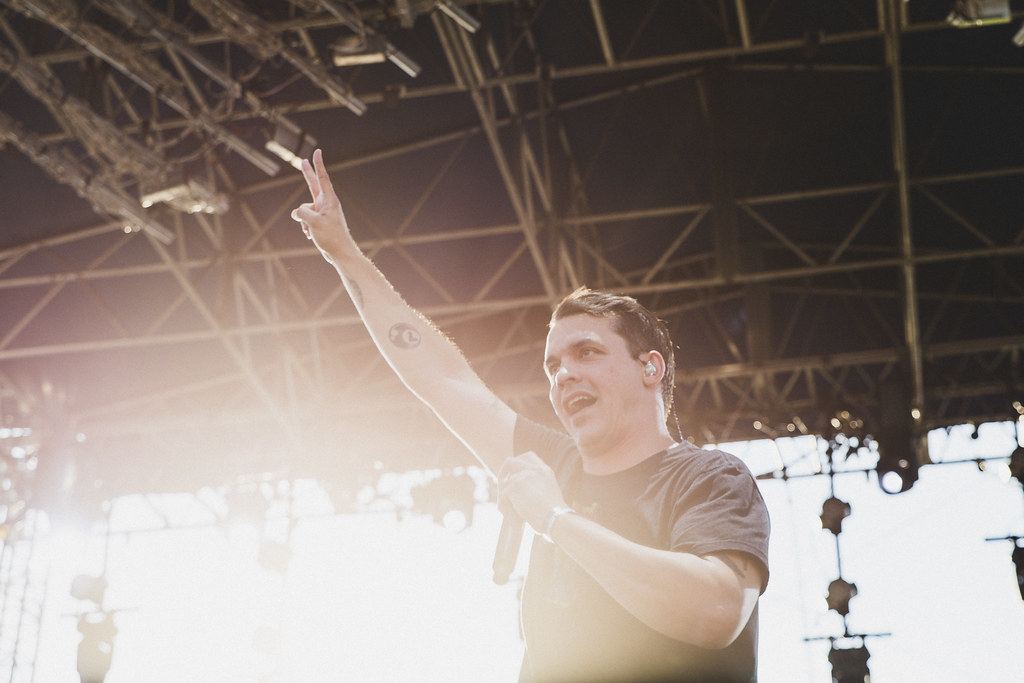
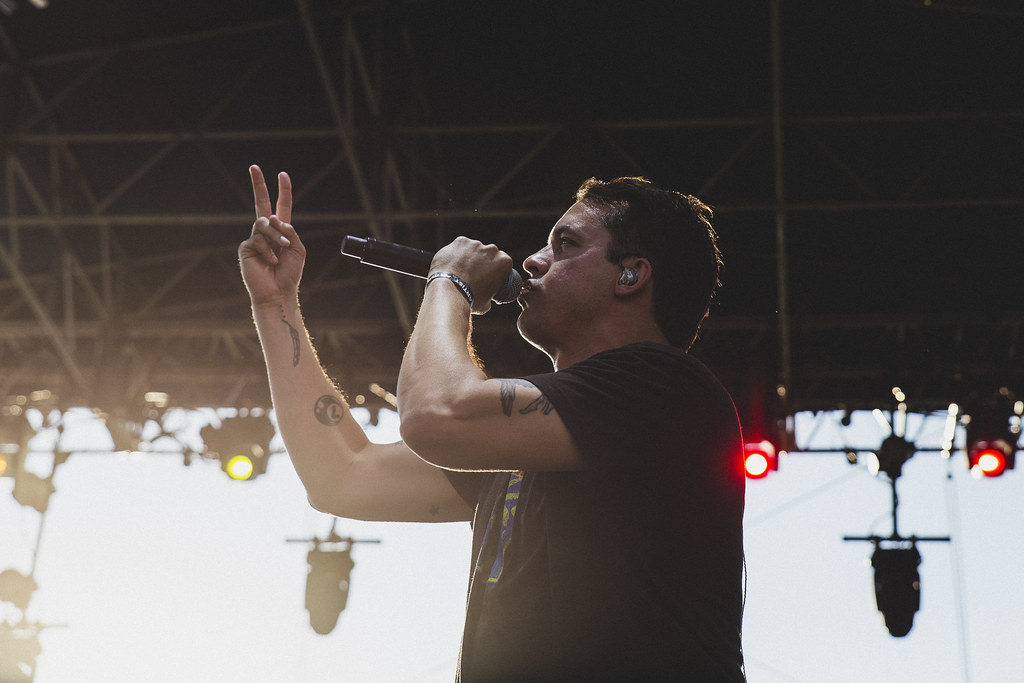
photos by JP Davis
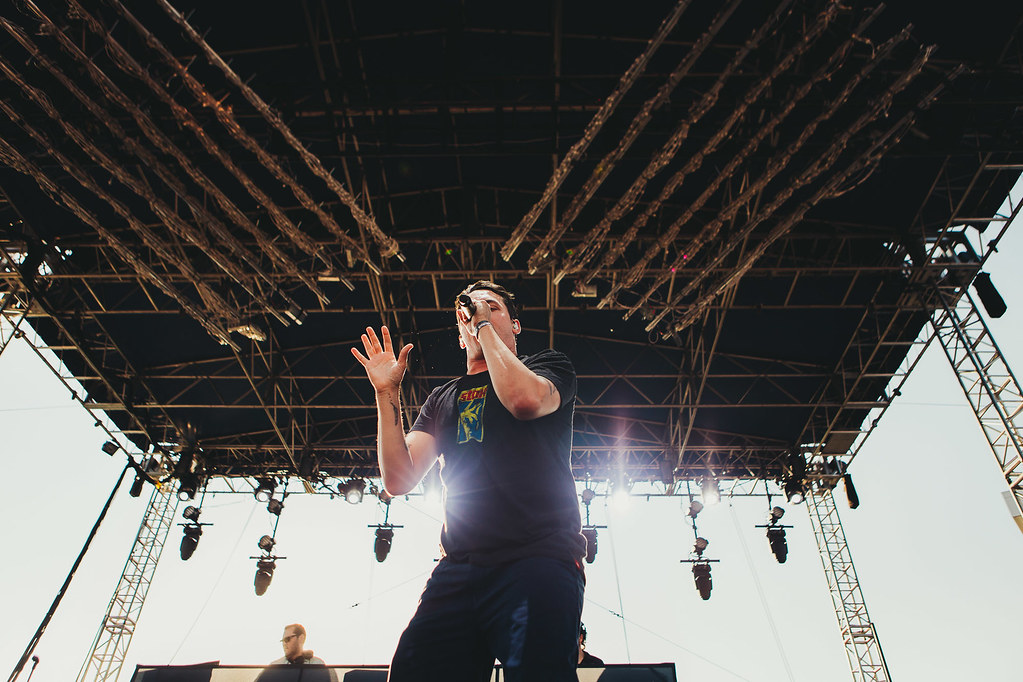
photos by Huy Nguyen
The Good Life
The setting sun behind Javlin Capital Stage’s provided a relaxing, late-summer backdrop for The Good Life’s career-spanning performance. Frontman Tim Kasher’s notoriety in Cursive and as a solo artist brought young and old to the hill in front of the stage just after 8 p.m., as Stinson Park began to cool down. The Good Life started off with “Everybody,” a blaring, guitar-heavy single from its latest album, Everybody’s Coming Down. The band celebrated its first LP in eight years the night before with a release show at Reverb Lounge. The set was not without old favorites, which the band played smoothly and without a hint of age. Kasher’s signature wail stood out in “I Am An Island” from 2002’s Black Out. Fuzzy guitars rounded out a somber tone in “Lovers Need Lawyers” from 2004’s Album of the Year. Because Everybody’s Coming Down was only one day old, fans could only bob their heads to moast of the new songs, but they cheered at the first few notes of last decade’s tracks, singing the lyrics with Kasher and raising their hands aloft. The sky was a darker shade of blue at dusk when The Good Life rumbled through the emotional “You Don’t Feel Like Home to Me.” Light, sporadic guitars weaved around Stefanie Drootin-Senseney’s bass. She and Kasher harmonized with breathy vocals during an instrumentally quiet moment in the song, a nice, breezy tone for the summer ballad. For “Notes in His Pockets” — from heavily utilized 2004 LP Album Of The Year — Kasher pounded the keyboard, reaching a climax with guitarist Ryan Fox’s shrill solos. The Good Life’s set was spattered with calm, folk-rock indie tunes that, without warning, would fuzz out in instrumentals with Roger Lewis’s sudden spastic drumming. One example was “Album of the Year,” a crowd favorite that crept in as a drunken love song before Kasher worked himself up and the band raucously struck their instruments for a vigorous finish. As the headliner for the side stage, The Good Life reemerged from its eight-year confidently with new additions to its discography. It seemed as if the band never took a break in the first place; the newborn Everybody's Coming Down tracks blended perfectly with decade-old songs for a rousing set. — Kelly Langin 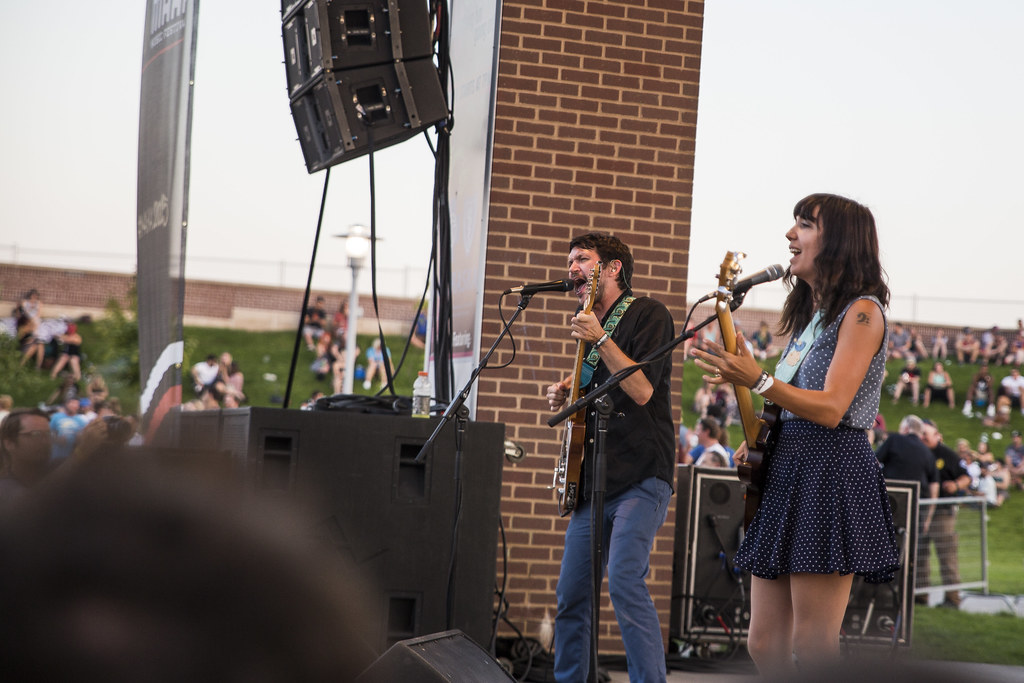
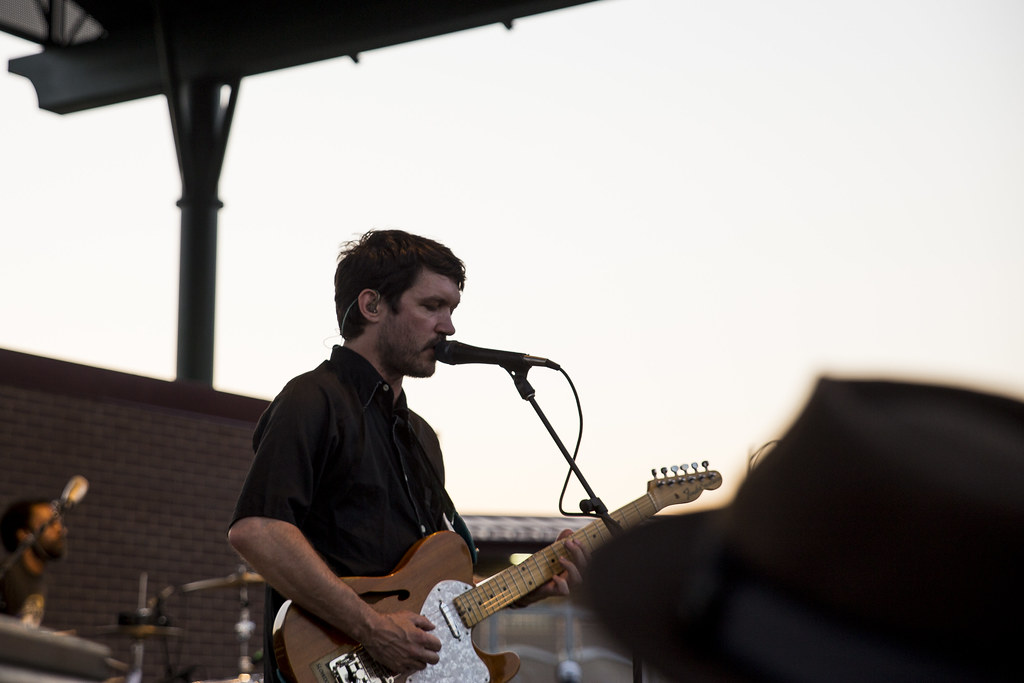 photos by JP Davis
photos by JP Davis 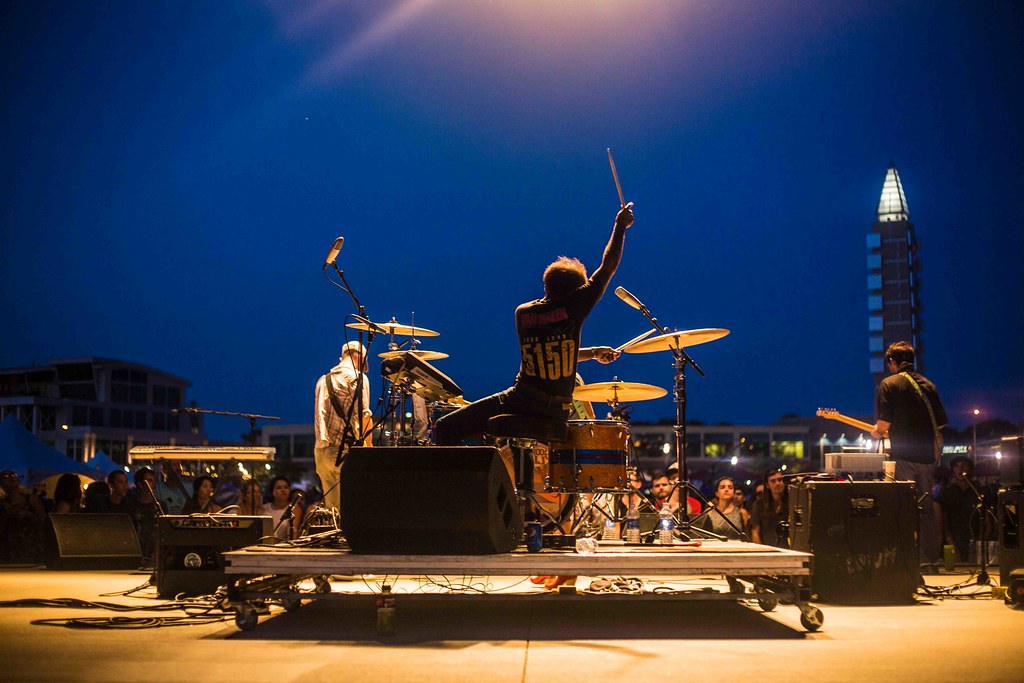
photo by Molly Misek
Purity Ring
A music festival is an experience comprising a series of moments. It's nearly impossible to string them all together; it's too hot to bask in the center of the Stinson Park slope all day, too humid to not retire to the water tank.
So it's the big moments, such as the hour-long sensory overload of Canadian EDM duo Purity Ring’s set, that make a lasting impression.
Before the first light popped, only those familiar with the band’s live performance could tell what was coming. Stage hands unfurled a veritable forest of beaded vines and uncovered the massive, custom-built control station that would serve as producer Corin Roddick’s home base.
When Roddick and vocalist Megan James took the stage, both clad in bright white to match the scene, the sonic and visual explosions served as the bucket of ice water the audience craved. Hanging lights exploded, dissolved and replenished themselves like Matrix code on “Obedar.”
Roddick flew up and down his array of MIDI controllers and trapezoidal drum pads — most visually striking on first usage for “Heartsigh.” He navigated seamlessly between the two, dispensing vibrant, acidic house sounds and heart-stopping bass.
The awe-inspiring grandeur of Purity Ring’s light show cannot be overstated. Colors ebbed and flowed from more than a hundred of those swaying vines, timed expertly with every Roddick swell and every James cry. The latter would often tangle herself in them and spin out toward the front of the stage. For “Stillness In Woe,” James used a hand-operated, five-pipe organ, digitally manipulating the jets of light that shot up when struck.
If the intense visual display was the show, James was its theatrical star. She glided across the stage effortlessly — save for a near-disaster mid-set at the edge of the stage — sweetly delivering high-pitched verse and electro-tinged chorus.
There is decipherable desperation and longing in songs like set-opener “Stranger Than Earth” and “Repetition. She sings “I wasn’t thinking ‘bout you” as if she might be convincing herself, or “tell me I’m the only one and I’ll move back,” with barren honesty. Against the backdrop of a spastic light show, the emotion spelled itself out brightly.
As the festival’s ultimate changeup, Purity Ring brought the glowstick dance party at the end of all those guitar bands. It was a musical reprieve enjoyed just as the hot sun itself had completely disappeared.
— Andrew Stellmon
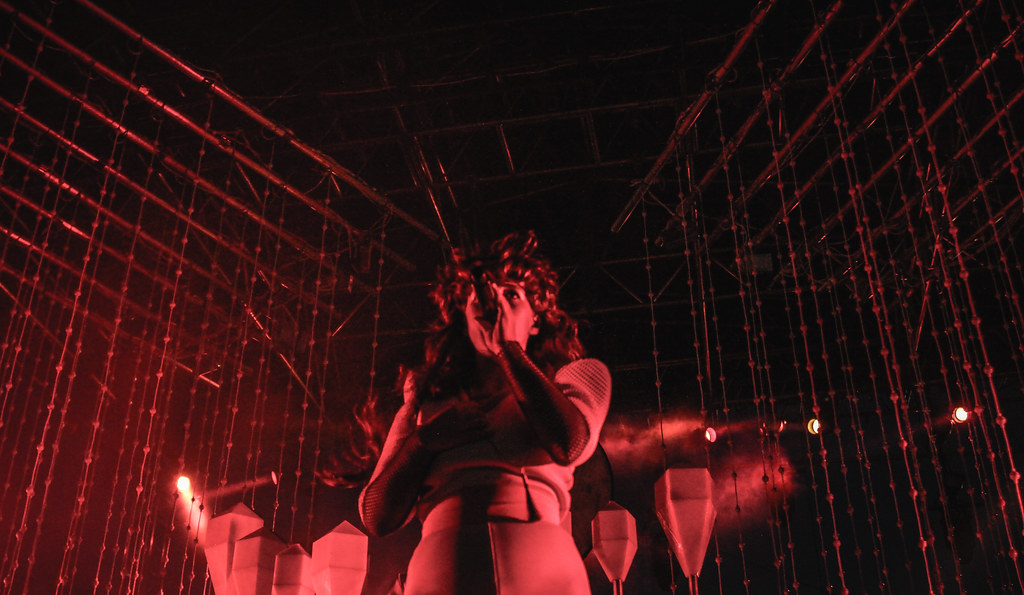
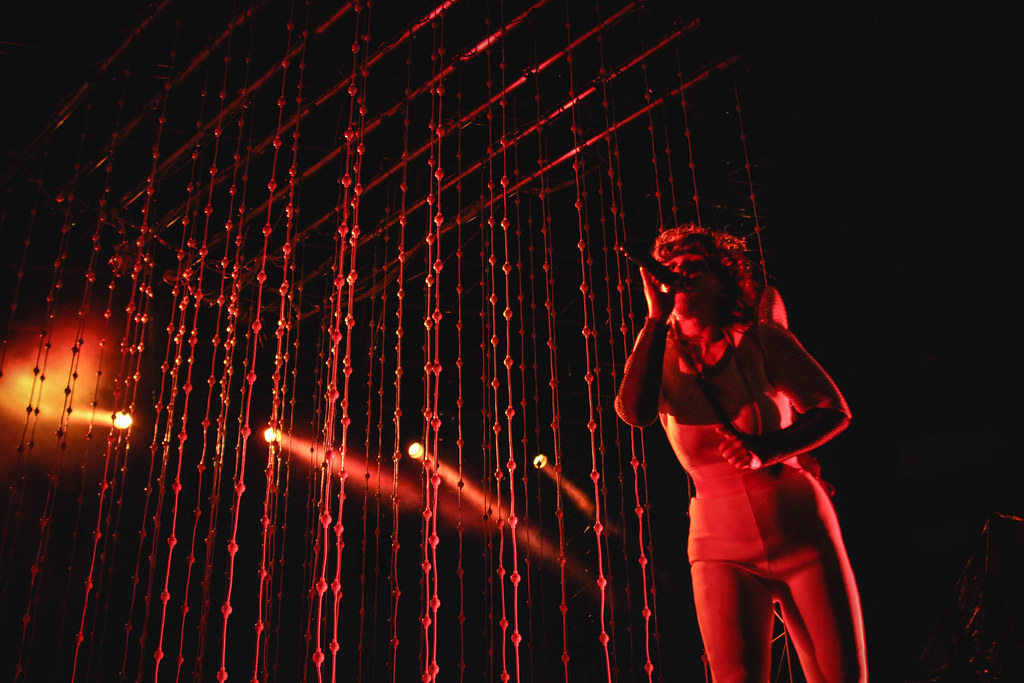
photos by Chris Dinan
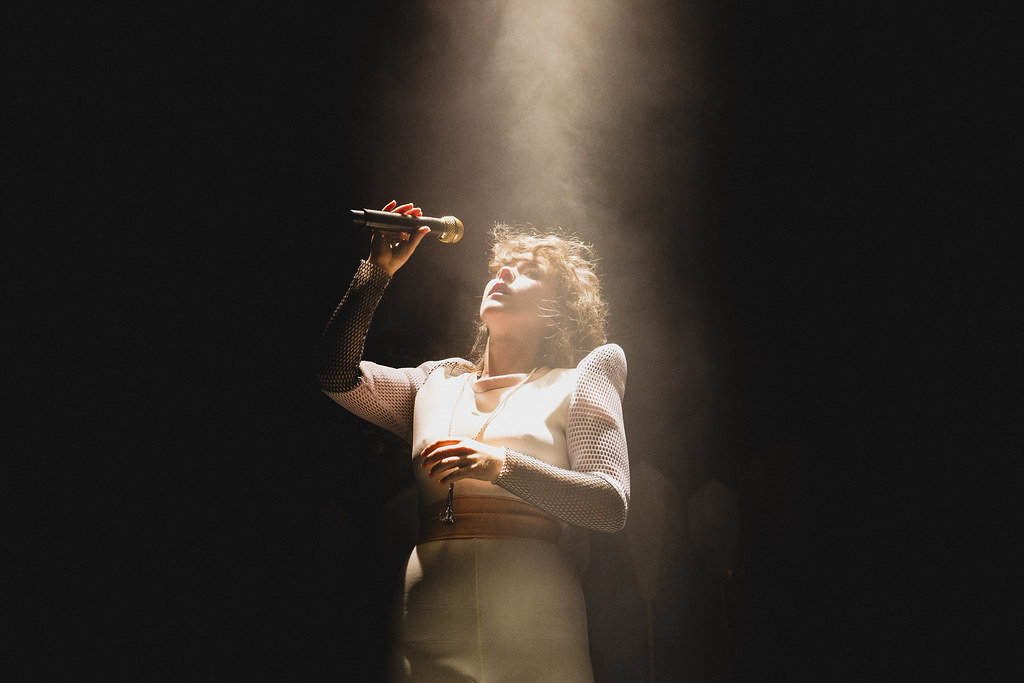
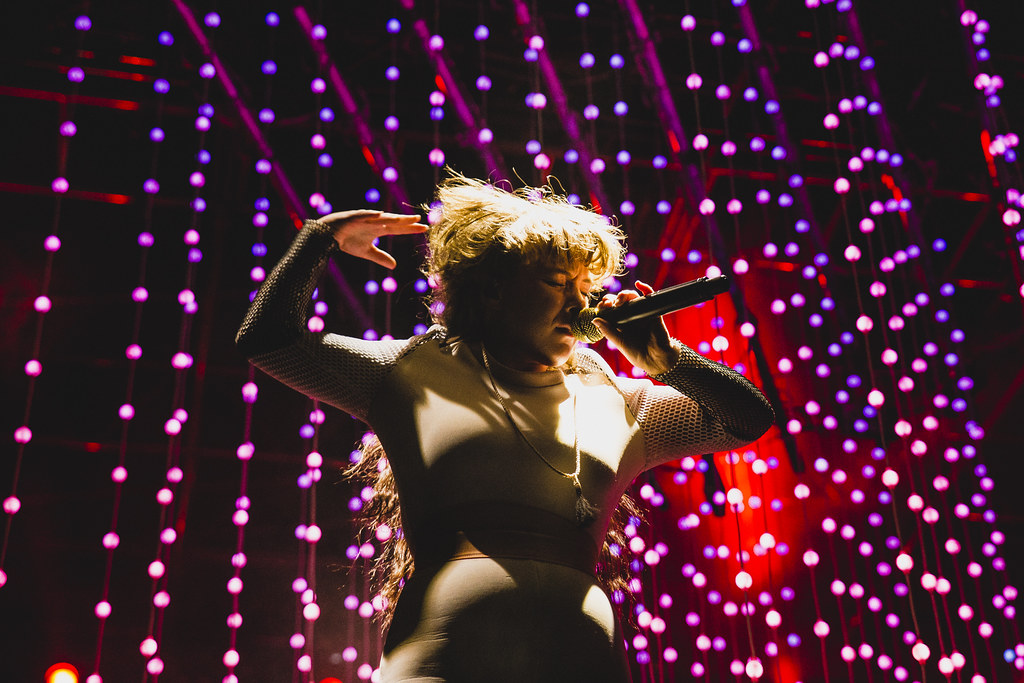
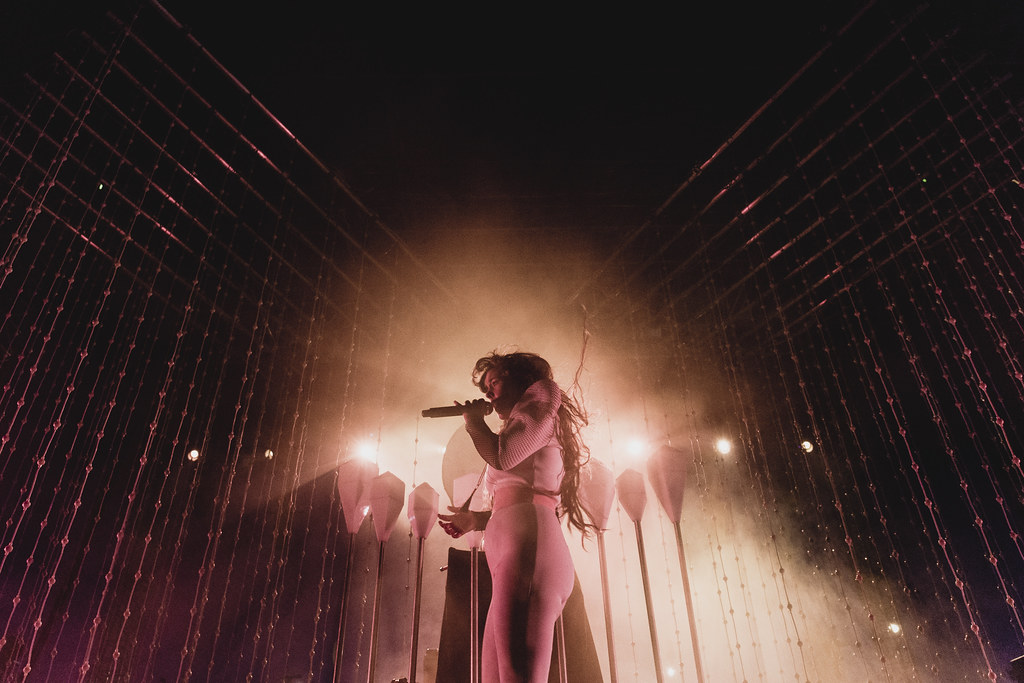 photos by JP Davis
photos by JP Davis
Modest Mouse
Think about what it means to headline a burgeoning, sold-out festival overflowing with national touring acts and an atmosphere overwrought with anticipation from a glowing sea of fans. A certain degree of patience is involved. Amidst the flying glowsticks and careening beach balls, it takes a seasoned act and maybe a bit of flair to own it. And maybe it helps to provide renditions of songs that depart in myriad ways from years of concerts and back-catalogue. Fielding a baseball-roster of band members, visually, doesn’t hurt. From stage entry amidst piped-in insect buzzing, Modest Mouse had all of that in spades. Frontman Isaac Brock was the performance’s obvious lynchpin — magnetic, energetic and charmingly odd. Despite lamenting a bum knee (“I got a sports injury; no sports!”), he was a ball of energy from start to finish, flying around his stage-left bubble and furiously bouncing that same knee to and fro. There was little trace of Brock’s famed hot-temper. Only when one of many flying glowsticks spun through the air and onto the stage during the folksy romp of “King Rat” did he warn “I’ll cut your throat myself” if it didn’t stop. An avid Modest Mouse fan would have immediately noted stylistic diversions from the veteran band’s recorded material. The players each rumbled their instruments to a rolling boil before allowing all sound to dissipate around Brock’s clangy intro to “The World At Large.” After marching most of the way through, the band careened into a huge rock outro. That kind of edge-teetering, breakaway instrumentalism would frequently rear its head throughout the night. Brock seemed to be trying to rip his guitar apart at the end of “The Tortoise and the Tourist,” and teethed out an incisor-plucked solo to polish off main-set closer “The Good Times Are Killing Me.” None hit harder than “Doin’ The Cockroach,” a six-plus-minute guitar-driven jam. Some songs like “This Devil’s Workday” and “Ocean Breathes Salty” were transformed, bearing traces of their recorded selves and winding down new paths. The former, an utter brass-laden romp on 2004 LP Good News For People Who Love Bad News, morphed into a dusty, bizarrely tempoed horseback ride, through which Brock managed a nimbly-picked banjo. Some wondered aloud if the band’s makeup altered their sound; nine deep, often with three percussionists, sometimes with both upright and electric bass and rarely without a weeping violin. But it has become custom over the years for Modest Mouse to carry upwards of six or seven musicians. At the heart of everything, they were still Modest Mouse songs. “Dashboard” was as grand and driving as always. “Tiny Cities Made Of Ashes” thumped along eerily and sputtered to a halt. “Paper Thin Walls” served as a gratifying, high-energy closer. Chalk up the differences however you’d like. The increased volume and fleshed instrumentation — banjo, horns, violin and anything that went clink or clank — certainly added a frazzled tinge to what always felt like dusty and worn folk. Playing to a massive crowd can bring out the louder, edgier side of a band’s catalogue. Drawing from their vast history, Modest Mouse punctuated the festival emphatically. — Andrew Stellmon 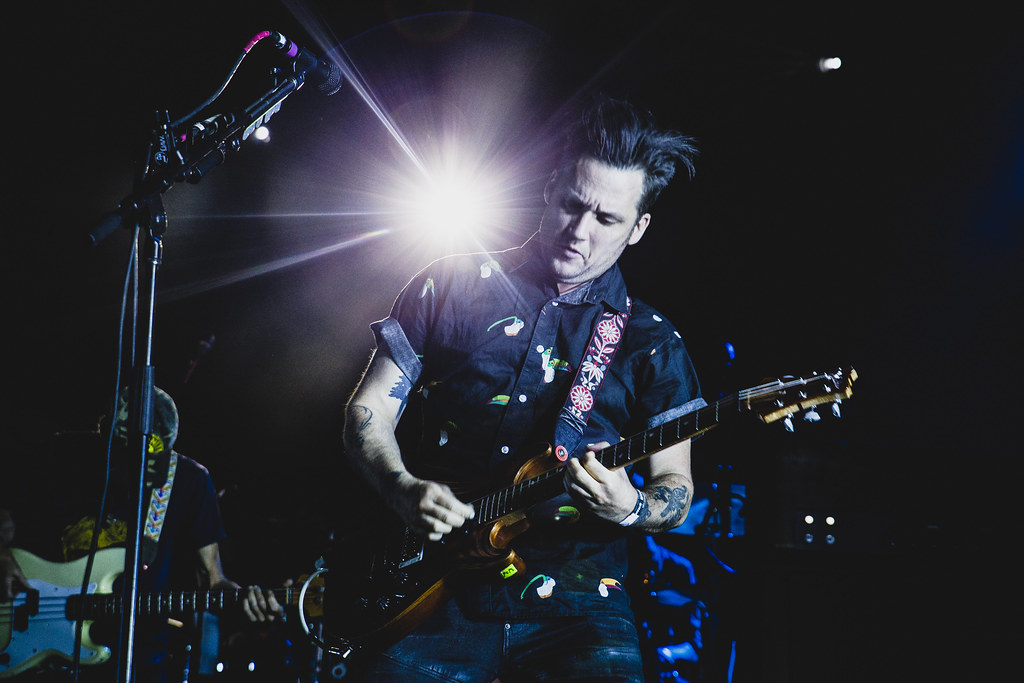
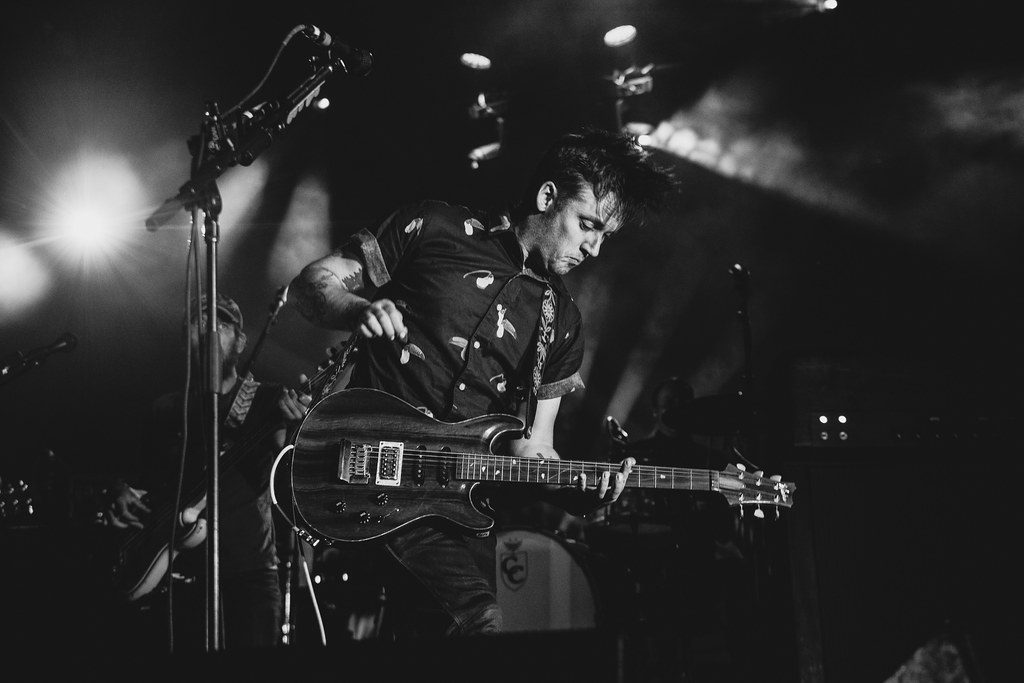
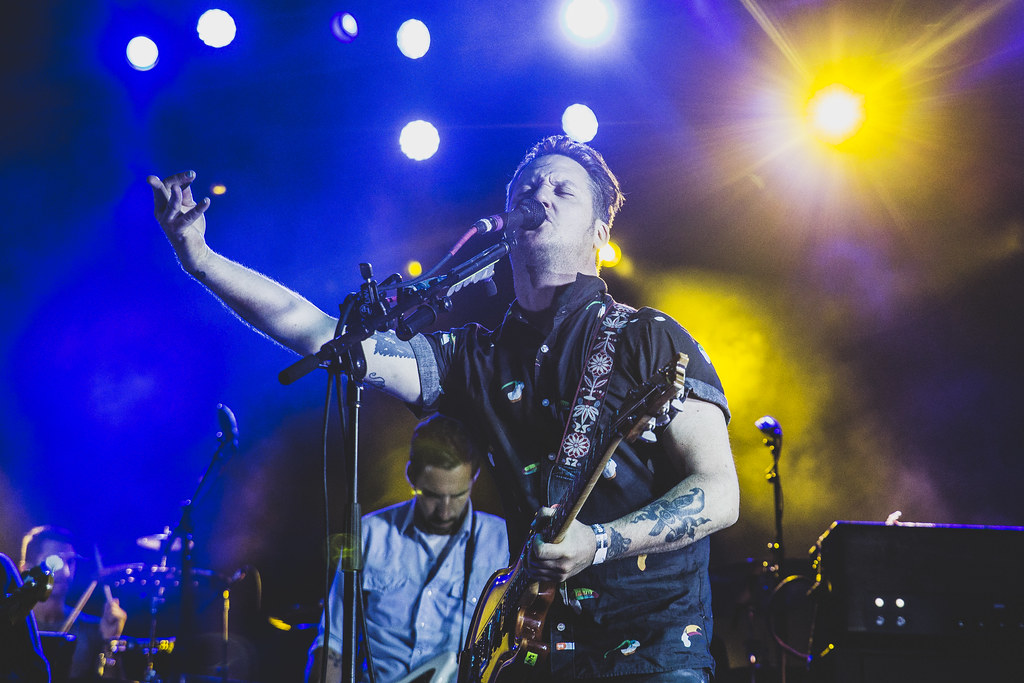

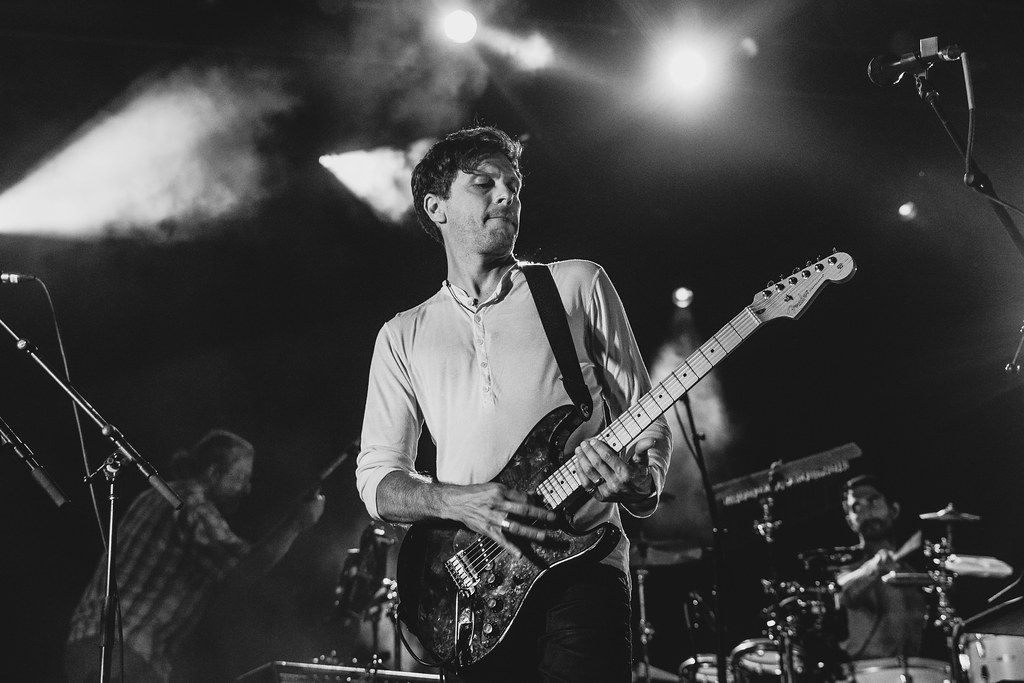 photos by JP Davis
photos by JP Davis
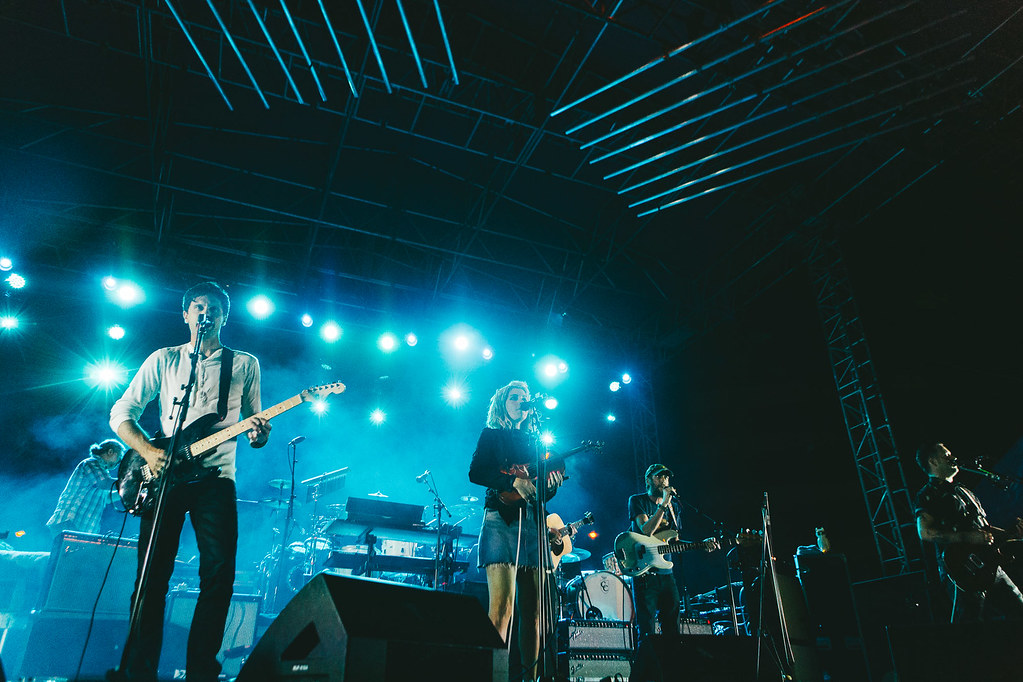
photo by Huy Nguyen 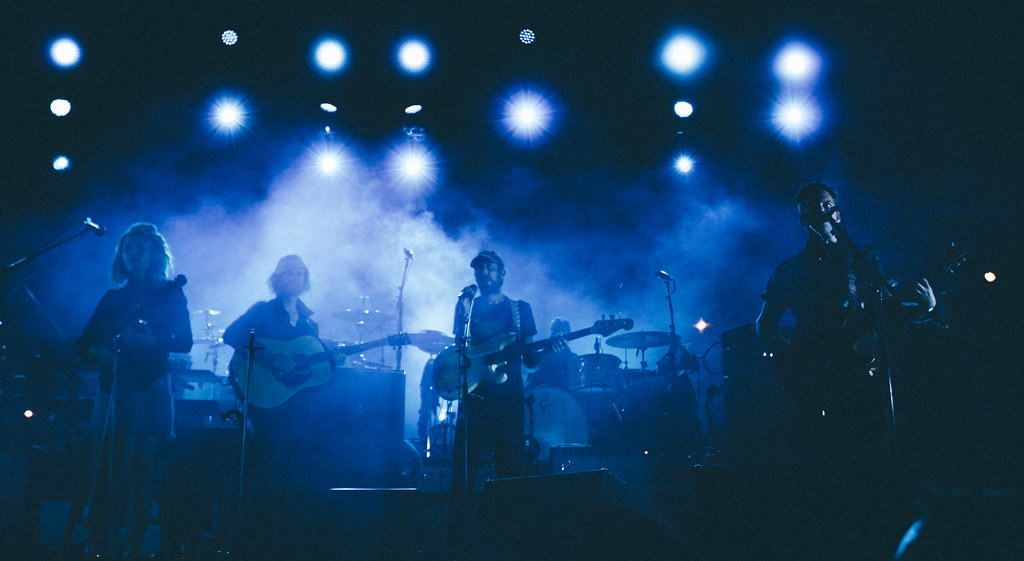
photo by Chris Dinan




